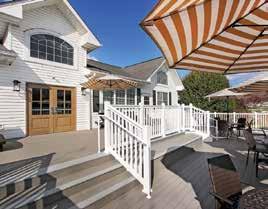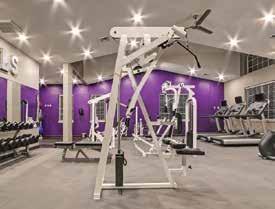THE STUDENT & ParENT GUIDE TO JMU








Back (from left to right): Sydney Foster (Photographer & Staff Writer), Maria Copeland (Staff Writer), Eda Tercan (Staff Writer), Joanna Sommer (Staff Writer), Megan Crews (Creative Director), Sarah Conti (Photo Editor & Staff Writer), Jinyi Liu (Photographer & Staff Writer), Chistina Butchko (Staff Writer)
Front (from left to right): Charlotte Matherly (Staff Writer), Gracie Brogowski (Staff Writer), ShelbyWalker (Editor-in-Chief & Staff Writer), Kylee Toland (Articles Editor & Staff Writer), Maddie McGrath (Marketing Director), Sarah Connor (Staff Writer)

64 West, 81 North. It’s a route you knew by heart before you were even old enough to drive. Making that drive back to Harrisonburg after winter break, I bet it never dawned on you that it would be your last time as a Duke.
With the start of every new week, your academic career at JMU is rapidly coming to an end. These were some of the best four years of your life, but it’s time to say goodbye — I know that’s hard. You’ve learned a lot about yourself since that tearful goodbye to Mom and Dad in August 2018, and you’ve grown more than you ever imagined you could. But here are some things I wish I could go back and tell you.
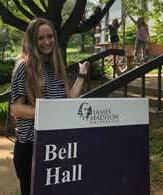
The best thing you can do to help your college experience is put yourself out there. Yeah, a good chunk of your high school graduating class decided to come to JMU, but you know you’ll only talk to one of them. You’re painfully shy, and you worry about making friends, but you’ll grow out of that if you do things that make you uncomfortable — you can start by embracing FROG week.
You’ll roll your eyes at the FROG dance and cringe every time you have to share a fun fact about yourself or talk about your favorite ice cream flavor in an ice-breaker. Those events will be painfully boring, but go to all of them. You’re going to make friends there who you’ll spend the rest of your year with — and you’ll bring a few with you through the next three years and beyond as lifelong companions.
Be open to everything. A group of people are going to Cookout at 1 a.m.? Say yes — eating your weight in Cajun fries and cheese bites will be some of your fondest memories. Your friends are going out to a party? Go — you’ll meet some of your best friends in some unlikely places, but just remember to be safe and always stand up for yourself.
If you’re scared of making friends, join an organization. There are over 450 clubs at JMU — there’s got to be one that piques your interest. Lucky for you, you found that one.
So, thank you for applying to The Breeze. It’s hard to imagine what life would’ve been like had you not applied to the Culture section on a whim that summer before your freshman year. You might not have fallen in love with journalism. You might’ve even changed your major. Instead, you’re walking away with unforgettable memories, like-
minded friends and a massive portfolio. College is where you find what you’re passionate about and how to turn that passion into a career. I’m proud of you for doing that.
Most college students are bound to have a roommate from hell. It’s almost like a rite of passage, and I’m sorry to tell you this, but you’ll have one on top of living through a global pandemic. And it’ll be bad. You’ll think about spending your junior year in front of a laptop screen at your parents’ house to get away from the situation — but you’ll learn from the experience and make better roommate decisions in the future.
When you’re deciding who to live with, make sure you know what you’re getting into; rooming with your best friends isn’t always the best idea. If you think you know someone, you never truly do until you room with them. So, have a good idea of who you’re allowing to move into that vacant room in your house. And please, ask them if they plan on bringing pets.
You’ll find that people’s idiosyncrasies can be enough to drive you crazy, and that stinks when they also happen to be your friends. Avoid losing a friendship by having patience — but speak up if something is bothering you. You’ll have some pretty messy fights because you let your problems fester inside.
It’ll be rough sometimes, but I promise it turns out OK. I bet you didn’t expect to have two random roommates your senior year, but guess what? They’ll become two of your best friends, two of your future bridesmaids. And that’s pretty cool.
Life has a funny way of throwing a wrench in your plans. You probably didn’t plan to spend half of your college experience in front of a computer screen, now did you? That’s something you just can’t plan for.
Your sophomore year will be cut short right after spring break, and the words “quarantine,” “social distancing” and “global pandemic” will start to sound like fingernails on a chalkboard. You’ll spend way too much time with your parents and not enough time with your friends. You’ll learn what Zoom and WebEx are, and you’ll have to figure out how to attend a whole day of classes from a computer.
You won’t be fully back in the classroom or take another in-person exam until senior year. It’ll feel like you aged 10 years in two. So remember, whatever the situation: It’s OK to not be OK.
A lot of times, you’ll hear people refer to JMU as the “Happiest Place on Earth.” Dukes hold doors, after all. But this won’t always be the case, and that’s
normal. Remember to cut yourself some slack and take care of yourself. And when that isolation period is up, make the most of your freedom.
In high school, you were a straight A student. Getting a B on anything made you cry. News flash: You’ll get a B+ in your first semester at JMU. I promise it’s not the end of the world.

Take your education seriously, and don’t discount those Gen-Eds. They’ll be some of the hardest classes you take here, and you can’t just wing exams like you did in high school. College can be the best time in your life, but don’t forget that you came here to get your degree.
Luckily, you’ll do a great job of staying focused on your schoolwork, and you’ll keep your grades up. That isn’t always the case for your friends, so help them in any way you can. You’ll be copyediting quite a few essays for them.
As you get to the end of this letter, I hope you realize that your four years at JMU will be the best years of your life. You’ll become exactly who you were meant to be, and you’ll walk across that stage and get your diploma with a sense of fulfillment — but, boy, will it be hard to leave. You’ll cry a lot realizing that you can’t slow down time.
So, make the most of every second and have a little fun. Oh, and eat a vegetable every once in a while.
by Amy Needham Photos courtesy of Amy Needham & Christine Brady Photography, LLC
135+ GROUP EXERCISE CLASSES WEEKLY


ADVENTURE TRIPS
HEALTH PROMOTION
OVER 50 SPORT CLUBS

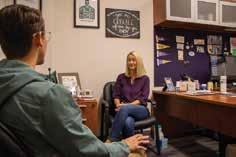
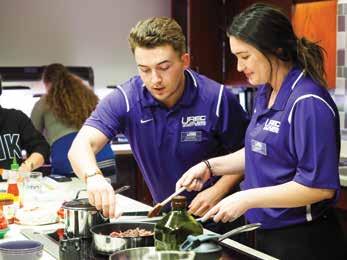
INTRAMURAL SPORTS









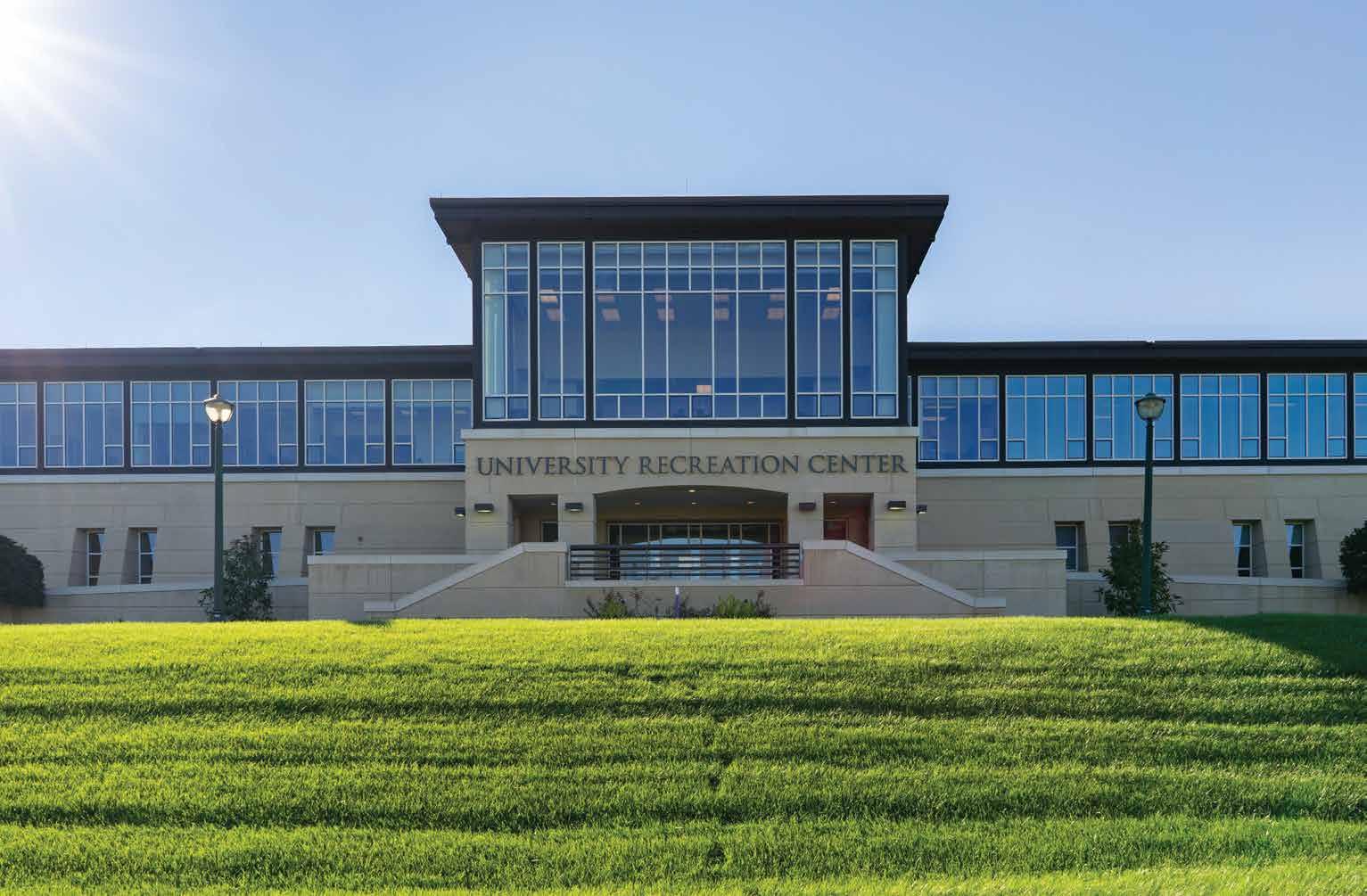
I was a senior in high school when I reluctantly accepted the idea of being a transfer student.
I had navigated the ups and downs of the college application process with excitement, but when my acceptance letters came in, the financial aid packages weren’t what I’d expected. Additionally, I was still fighting the worst of an attack of Lyme disease I’d contracted when I was 15. I wanted more than anything to pack my bags and take off for college, but as graduation approached, that possibility shrank with every week spent in occupational therapy. Eventually, my mom persuaded me: Community college is a smart option. It’s cheap. You can stay at home for two years; you can transfer somewhere else in two years.
The idea of transferring swiftly became my lifeline. I started researching, and learned that James Madison University had a full-tuition scholarship available to transfer students. I resolved to win it.
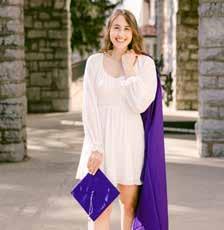
With that resolution as a starting point, I found that my two years at Northern Virginia Community College passed quickly. I spent nearly the entirety of my first semester in a fog of apathy, fighting off a new round of autoimmune symptoms, and taking largely undemanding gen-eds. During my second semester, though, I joined the Honors Program, and I started volunteering for campus events. Because there wasn’t a journalism program at my school, I majored in communication studies and made a brief foray into politics (I ran for SGA). I was selected as the Vice President for the Loudoun campus at the end of my freshman year, and spent my sophomore year running townhalls, managing a food pantry out of the SGA office and working on an initiative to make building entrances more accessible across campus. I became an ambassador for the Honors Program, launched a writing club with a friend and joined the a cappella team.
Even though I’d found a home at community college, I was more than ready to transfer by the time I reached the final semester of my sophomore year. I planned applications for four schools and sent in my last form — to William & Mary — on February 29. By the time I received the phone call that I’d earned my scholarship, it was April, and the world had overturned. The pandemic and subsequent lockdowns had altered my daily reality to the point that moving to Harrisonburg, and starting at a new university, felt like an entirely different life.
In August, I found myself in an apartment on the crest of Port Republic Road, with transfer orientation scheduled for Monday. I’d been randomly matched with my roommates, and though we’d texted back and forth, I didn’t know any of them until I showed up in Harrisonburg. The day my dad dropped me off, I hadn’t even figured out how to set up the apartment’s WiFi before he had to leave. It felt like an unpromising signal for the start of the semester.
On Monday, the most important things I took away from transfer orientation were my JACard and the two-day D-Hall meal pass; I skipped all optional get-togethers to hang out with new friends from a campus ministry instead. My classes — SMAD 101, a philosophy class for my BA requirement and an assortment of electives chosen nearly at random during remote transfer student registration — were exciting for about three days, before they transitioned to being fully online after the first week.
In that first semester, and in the three that followed, I discovered the peaks and perils of life as a transfer student in full, accentuated by the extraordinary changes caused by COVID-19 and the ordinary challenges of being an upperclassman journalism student. If I could give my confused twenty-year-old self a few words of wisdom, they might look something like the following.
My first piece of advice: Know the advising sheet for your program inside out. You should speak with your adviser as soon as you can and as often as you need, but you should be prepared to do your research. I would recommend mapping out all of your projected semesters at JMU and then running those plans past an adviser. Your program advising sheet is your best guide to your way forward.
My second piece of advice: Know your own credit reports inside out. The sooner you calculate where you are in your journey to graduation and what else needs to happen, the sooner you’ll know whether you need to take summer classes, extra semesters or anything else. Your transfer adviser may tell you most transfer students require five semesters to graduate, instead of the typical four. I crowded my credits into four semesters, because SMAD is a relatively small program, and also because I didn’t take a minor (for the reason I didn’t understand how
to fit it in). If you think a minor is something you are even remotely interested in, research it for yourself during your first semester or ideally, before you enroll.
Also, JMU has a graduation requirement for transfer students that you must have earned 50% of your credits from a four-year institution. In my second-to-last semester, I was off by a couple of credits, and I wasn’t alerted to this fact. If I hadn’t checked my graduation application status on a whim, I probably wouldn’t have been able to finish on time, and I would have missed graduation by one class. Know your numbers when you transfer, and know what they need to be when you are ready to graduate.
Finally, my third piece of advice: Front-load your extracurriculars. If you can pinpoint what you want to do outside of classes in your first semester, you’ll have more time to invest in those activities. Transfer students have only two years to experience what most people have in four. I started writing for The Breeze as a junior, after sending in my application as soon as signups opened. Although that didn’t lead me into an editor position the following year, it did mean that I could spend two years writing for the Culture section, and it connected me with people who’d become my classmates and friends in my senior year.
So how do I feel now, as a graduating senior, at the end of four years? In some ways, I’m satisfied — I found a way to finish my credits according to the typical four-year timeline. I’m also tired. I’ve worked multiple jobs, held an assortment of leadership positions and participated in a lineup of extracurriculars. I’ve been stressed about my enrollment every single semester.
And four semesters have gone by so, so quickly. I love the Harrisonburg sunsets and Broad Porch chai lattes and Gift & Thrift book sales with my entire heart, and even in this brief time, I’ve made friends I plan to keep for a long time. I’ll miss the early spring cherry blossoms and the snowy mountain roads, waiting in the Chick-Fil-A lines on the bottom floor of D-Hall and picking up my print copy of The Breeze outside Carrier. I’ll even miss wrestling with Final Cut in the basement classroom in Harrison Hall and hauling bags of checkout room camera gear across the quad (sure, okay, that might just be nostalgia talking). It’s bittersweet to have had such a short time at JMU, and even though there have been challenges, I will cherish so many memories of my two years here.
All this to say: Transferring isn’t for the faint of heart, I’ve learned. It’s for the courageous. So, if you’ve chosen that path, I salute you — and I hope you know there are people out there who have traveled it before and are traveling it with you. As lonely as it might feel at times to be a transfer student, because most people won’t share that experience, you’re not alone. And it doesn’t make you any less of a Duke. Transfer students bleed purple, too.
I hated JMU.
I wish I were kidding. For my entire first year, I was incredibly overworked, confused, isolated and unhappy.
The good news? I’ve now found my place here — my family, my joy, myself.
I arrived at JMU in fall 2019. After being homeschooled since third grade, I took dual credits at a community college in South Carolina, graduated high school early, then moved to Virginia and attended Piedmont Virginia Community College in Charlottesville while waiting for in-state tuition to hit. By the time I got to Harrisonburg, I had a pretty good grasp on college. I knew what to expect in classes, and I knew how to study.

I came to JMU looking for the traditional yet ever-elusive “college experience.” While I’m grateful for my time in community college, I’ve always said it felt like all the work of higher education with none of the fun. I grew up hearing stories of my mom’s glory days at the University of North Carolina, and I had specific ideas of what I thought JMU would be: coffee dates, frisbee on the Quad. But, with a classic roommate horror story and the pandemic upending my second semester, the “college experience” isn’t at all what I got.
At first, my hopes were shattered. I grieved the loss of my college ideal. Sometimes, I still do.
Every day, I rode the bus to class (while we’re at it, get the parking pass — I promise it’s worth it) and came straight home. I stacked my classes with no breaks just so I could get home earlier, and that’s the worst thing I could’ve done. It wasn’t until I really started spending time on campus — with COVID, that was last year — that I started to enjoy college.
What really changed the game for me, though, was finding my niche. I found that I didn’t need to join everything, I just needed to join the right thing. For me, that was The Breeze. I joined as a culture writer in 2019 on a whim and found that the more involved I was, the happier I became. Fast forward three years — I’m now the editor-in-chief.
I found my passion and my family at The Breeze, and journalism kept me connected with my community during the pandemic. Even in the strictest lockdowns, I was talking with students, professors and Harrisonburg locals, listening to their stories. When it felt like I couldn’t step outside my house, journalism connected me with an entire school and small town.
As a journalist, I’ve seen the best and worst that
JMU and Harrisonburg have to offer. I’ve written about JMU softball’s return home from the 2021 Women’s College World Series, and I’ve covered oncampus tragedies and students’ outcries for mental health support. Nothing has immersed me in this community quite the same way, and I’m better for having done that.
For some people, joining five clubs might be right up your alley. For me, I just needed one reliable thing. I started out at JMU wanting to leave as fast as possible. That one thing is the reason I’ve decided to take a super senior year.
I’ll leave you with three pieces of advice, three things that helped me find my happiness at JMU.
First: I know it’s hard to put yourself out there, especially as a transfer student — but you have to do it. Transfers don’t get the same orientation, welcome and excitement that freshmen get during FROG Week. We don’t get to bond with our freshman year roommates or make friends in our residence hall. Being a transfer is sometimes incredibly lonely.
Still, try joining organizations and clubs you’re interested in. I’ve found that most people at JMU are welcoming and kind. What do you have to lose? In all likelihood, something will stick. For the ones that don’t, at least you can say you tried. And you never know, you may learn more about yourself and find more happiness than you ever thought you would. I know I did.
Second: Ask questions. Because transfers don’t get the same level of orientation and help as freshman, you’re bound to feel a little lost sometimes. If you’re confused about how the bus system works or where Miller Hall is, just ask — most people are happy to help.
Beyond that, just talk to people. It’s OK to lean on others for support. That’s something I learned the hard way, but once you accept that you can’t do it on your own and start asking others for help, life gets so much easier.
Get to know your professors and ask about their field of study. Not only can it open the door to professional opportunities, it can help you gain perspective. I stop by my adviser’s office several times a week just to chat and check in, and I’ve learned more in those conversations than can fit into any class period.
Third, and finally: Realize that college isn’t perfect — it never will be, and that’s OK. Many have compared JMU to Disney World, calling it “the happiest place on Earth.” For me, and for many people, it’s not. Once I came to terms with that, I was finally able to enjoy JMU for what it is: the place where I’ve learned and grown into myself, the place where I’ve found my passions and met friends who quickly became family.
Sometimes, JMU will be sunny days spent on the Quad and late-night study groups with friends where you’re having so much fun, it doesn’t even matter that you’re being crushed by the weight of final exams. Other times, it will be lying on the floor crying on FaceTime to your mom or eating Chickfil-A alone in D-Hall for the fourth time that week. JMU, like most things in life, is what you make of it. Let go of the idea in your head of what JMU will be. Focus instead on what it can be.
Q: HOw caN I MaNaGE crEDITS aND ENrOLLMENT?
Charlotte: Talk to your advisor — they can help you understand the website jargon and the dreaded credit math. It’s also helpful to look at your unofficial transcript through MyMadison, as it logs every college class you’ve taken, even outside of JMU, and can help you determine whether you’ve received a JMU credit for each class.
Maria: Find your program advising sheet. Bookmark it on your laptop. Look at it a couple hundred times a semester. It’s the best guidebook you have for navigating your way through JMU. I can’t say this enough.
Q: HOw caN I MakE SUrE I’M ON Track TO GraDUaTE?
Charlotte: Again, stay in touch with your advisor. Typically, I lay out my class schedule for each semester, then run it past my advisor to make sure I’m checking all the boxes.
Maria: Learn your way around MyMadison as quickly as you can. The “My Academic Requirements” page is going to be your best friend. Check this at every enrollment point, because it keeps track of your credits and what you have left to complete.
Q: HOw caN I STaND OUT aND SUccEED IN MY MaJOr?
Charlotte: Pick a few professors in your major that you admire and get to know them. Go to office hours just to chat — build those relationships. They can give you personalized advice, and some may offer you research or work opportunities in their field, which is a great way to get started.
Maria: If I hadn’t transferred during 2020, I would have spent so much time in professors’ office hours — in person, because Zoom is not fun! I regret that now. Go hang out with your professors, especially if they’re in your program. I treasured friendships with my professors at community college, and I wish I’d pursued that more during my time at JMU.
Q: HOw DO I FIND a PLacE TO LIvE aS a TraNSFEr STUDENT?
Charlotte: Research the options in your budget and lay out what’s most important to you. For me, my priorities were being close to campus and town, having ample space to relax in my own home and the overall vibe of the neighborhood or complex. I didn’t have any of that in my first year at JMU, and once I switched housing, things got so much better for me because I was happy in my living space.
Maria: Join Facebook groups for your graduating class! And never underestimate the power of meeting someone over a social media post — or a Canvas discussion, for that matter. I met one of my best friends at JMU in a Canvas get-to-know-you thread.Also, people in Harrisonburg sign leases so early it will give you whiplash. If you transfer in as a junior, be ready to sign for your next year around October.
Q: HOw DOES JMU aND UNIvErSITY LIFE DIFFEr FrOM cOMMUNITY cOLLEGE? IS IT BETTEr Or wOrSE?
Charlotte: It’s a lot easier to get involved at a four-year university like JMU. Community college students often have other jobs, live with their families or have other commitments, so there aren’t a ton of extracurriculars, which makes it easier to make friends and find your life and routine outside of class.
Maria: The biggest difference for me was the scale adjustment. JMU is a lot larger than my community college. JMU class sizes are larger than those at my community college. You get the idea. Overall, JMU is better for social life and extracurriculars, and for programs that community college can’t offer; there wasn’t a SMAD equivalent at mine, for example, and the nursing program was very exclusive.
Q: HOw caN I GET acQUaINTED wITH JMU aS a TraNSFEr STUDENT? (SINcE wE DON’T rEcEIvE THE SaME LEvEL OF OrIENTaTION aS FrESHMEN)
Charlotte: In my first year, I got stuck in the class, home, class, home rotation — don’t do that. Not only is it isolating, you’re also only on cam-
pus for classes. Study on campus, eat on campus and hang out on campus. Spend as much time here as possible, and that familiarity and feeling of home will come.
Maria: I walked nine miles on the first day of transfer orientation, trying to map out the campus in my head. I really don’t think I’m the right person to ask.
Q: wHaT arE SOME OPPOrTUNITIES aT JMU FOr TraNSFEr STUDENTS?
Charlotte: There aren’t a lot of opportunities at JMU aimed specifically at transfer students, so I’d advise you to just take advantage of as many resources as you can during your short time at JMU. Befriend your professors and classmates and keep up with news and events in your major.
Maria: I would recommend looking into on-campus jobs, especially if you’re coming in as an upperclassman. I’ve worked for Student Affairs Communications and Marketing during my senior year, and I wish I’d heard of it sooner.

Q: HOw caN I FIND OTHEr TraNSFEr STUDENTS ON caMPUS?
Charlotte: Honestly? You don’t. Besides the transfer orientation, there
aren’t any opportunities for transfer students to come together. Instead of limiting yourself to transfer students, talk to people in your major or in the Starbucks line. You might find a transfer student somewhere out there, but JMU leaves you to figure that out on your own.
Maria: Transfer orientation might help you a little here. Other than that, you’re on your own; in my experience, JMU hasn’t offered transfer-specific events the way it does for freshmen, so you’ll rarely find yourself around a group composed only of transfer students. Find people in Facebook groups. Talk to people in your classes. Save their phone numbers.
Q: HOw caN I GET INvOLvED ON caMPUS?
Charlotte: Don’t be afraid to go alone. You won’t find that community without putting yourself out there — something I learned the hard way. Apply for everything, even if you have the tiniest interest and aren’t sure you’ll like it.
Maria: Go to Student Org Night or check social media to find out if different groups are having “welcome week” activities the first week of the semester! Follow any orgs you’re interested in on social media, and make sure to show
up regularly, not just to a few events.
Q: HOw caN I GET INvOLvED IN THE HarrISONBUrG cULTUrE aND cOMMUNITY?
Charlotte: I’ve never been one to just go downtown and explore, although over the years I’ve come to know Harrisonburg like the back of my hand. What really connected me with this community was working for The Breeze. Writing for the culture section, I was able to meet people who live and work in the community. It also seems easy to forget that our professors all live here, too — ask them for advice and recommendations in the area.
Maria: I didn’t have a car for most of my time at JMU. I discovered Harrisonburg primarily by walking downtown. A friend of mine showed me how to walk to Black Sheep from campus during orientation, and that was about all the motivation I needed to explore the downtown area by myself. Check out the local businesses. Meet someone for breakfast at Heritage Bakery (especially if you’re gluten-free or vegan!), study at Coffee Hound instead of Carrier and buy a face mask from WithSimplicity. Memorize the farmers’ market schedule. Go to Magnolia’s or Rocktown Kitchen. The options go on.
At first, college life seemed to be a blur of stressful classes, stuffy dorm rooms and noisy halls. In search of quality alone time during her freshman year, Meghan O’Sullivan decided she needed to find a way to unwind away from it all. She found solace in a 30-minute walk once a day.
Now, a senior elementary education major, O’Sullivan still finds the time for her daily walks. Living off campus, these walks have helped her fit relaxation into her schedule and provided an opportunity to connect with neighbors she might not have met otherwise.
“I learned how much I needed just a few minutes to myself,” O’Sullivan said. “Sometimes I listen to music or a podcast or I just walk without listening to anything, which is nice [because] it lets me think for a moment and enjoy the sun.”
Whether it’s taking a day off to relax, treating yourself or heading outside to connect with nature — you get to define what self-care means to you. Bridgette Carey, a junior musical theater major, commented on how she views selfcare and explained some common misunderstandings.
“The misconception is that selfcare can be a one time or a special thing that you do for yourself when you deserve it,” Carey said. “It should be something that you continue every day like taking care of your body and taking care of your mental health.”
JMU is a fast-paced and extroverted campus where balancing schoolwork and social life can be draining, which is why fitting stressmanagement into your schedule is so important. If you haven’t found the right method or are looking for more ways to improve your routine, here are some ways JMU students choose to destress.
1
For O’Sullivan, taking the time to socialize and grab a cup of coffee while being productive serves as a vital part of her self-care routine. Harrisonburg is scattered with various food trucks, local thrift shops and other family-owned businesses — if your schedule needs a refresh, find a place to explore and maybe test out something unfamiliar.
equipment you might need.
Finding a new restaurant or hobby to try can be a good way to break routine and create habits. Looking to break from her regular schedule, O’Sullivan added a trip to Black Sheep Coffee in Downtown Harrisonburg to her weekly routine.
“Every Friday I try a new coffee,” O’Sullivan said. “I usually tell the barista to surprise me, which is really fun.”
Carly Sines, a wellness instructor for UREC Health Promotion and senior health sciences major, discussed the yoga and guided meditation classes at the mind and body studio and Health Promotion’s guidance for students.
Wordsby Maddie McGrath Illustrations by Megan Crews
Fans are a great way to cool down your dorm if you don’t have AC! Put them in your window, on your desk or clip them onto your bed for a cool room!
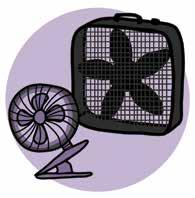
Carey has made visiting JMU’s Counseling Center a part of her self-care routine, specifically, its relaxation and stress management resource: The Oasis. This oncampus spot offers students an escape from the hectic atmosphere of undergraduate life.
“The Oasis is a really cool place,” Carey said. “It’s there just for that relaxing moment that students need to destress.”
With offerings like yoga mats, massage chairs and noise-canceling headphones, The Oasis presents a soothing environment for students.
2 3 5
Whether it’s lounging on the Quad, playing sports with friends or taking a trip to Shenandoah National Park, finding the time to be outside is a great place to start in crafting your ideal routine.
O’Sullivan enjoys playing pickleball with friends as a form of self-care.
“I like to be outside and spend that time with my friends at least once a week,” O’Sullivan said. “The pickleball courts are a place [where] I can enjoy the outdoors in a social setting and the endorphins help me relax.”
If sports aren’t really your thing, head to the Quad and string up a hammock or take a weekend trip out of town to go camping with friends. The Shenandoah Valley has numerous scenic parks, campgrounds, and hiking trails to immerse yourself in the outdoors.
With a variety of resources, UREC provides students different ways to alleviate daily stressors. If fitting exercise into your schedule is an important part of your routine, UREC’s fitness center has all the
“UREC is a great resource for students to utilize for their own self-care needs,” Sines said. “In Health Promotions there is wellness coaching, which can help students with questions about substance misuse and sexual and relationship help.”

Both the mind and body studio classes and wellness coaching are available to book through the UREC register. These amenities are available to students at no additional cost and are a great way to maintain your physical and mental health.
Repeating meaningful statements to create a positive mindset is also one of Carey’s favorite ways to practice self-care. This mental form of assurance is used to motivate and encourage a healthy outlook and improve selfesteem.
“I’ve been doing affirmations since freshman year,” Carey said. “Affirming yourself throughout the day just saying, ‘I got this, I can do this, I’m smart enough for this,’ is important to remind yourself every day.”
Whether it’s self-assurance on a hard day or daily declarations to improve your state-of-mind, positive affirmations can shift your mindset and lifestyle completely.
Developing a self-care routine that benefits you can take time. But for students like O’Sullivan, it’s worth investing the time in yourself. It can be difficult to break schedule or adopt new activities into an already busy everyday life, O’Sullivan said. But soon, she got into the groove of self-care.
“Start with small, simple habits,” O’Sullivan said. “Once you have a
Do you have a Jack & Jill bathroom? Make sure to stock up on all the essential cleaning supplies: toilet bowl cleaner, hand soap, paper towels, toilet paper etc. This will help you keep your bathroom tidy.
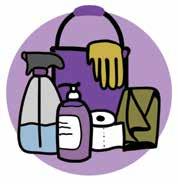
Bring along a mattress topper, alternative seating and a desk hutch to help make your room feel like your own. An eye mask and humidifier are also essential to getting a good night’s sleep and beating an illness!


Get to know more about JMU’s Counseling Center from this Q&A with the Associate Director for Administration, Nina H. Critz, LPC
Q: HOw DO I kNOw IF I NEED cOUNSELING aND THaT THE cOUNSELING cENTEr IS THE rIGHT PL acE FOr ME TO SEEk HELP ?




A: It depends. Not everyone who is upset needs counseling. Sometimes feeling bad is a normal reaction to painful events, unhealthy relationships, or significant changes. However, just because it is a normal reaction doesn’t mean you should go through it alone. It can also be possible if you’ve dealt with something long enough, that it can become “normal” and easy to talk yourself out of doing something new. Some people are so embarrassed about what they feel or believe they never share it with anyone, even though it might be a common experience.
Q: HOw DO I TakE THE FIrST STEP ?
A: Take this free, online assessment. It may highlight some potential areas of concern. Once you have that information you can decide what might be a good next step.
Q:wHaT HaPPENS wHEN I FIrST vISIT THE cOUNSELING cENTEr?
A: To access services for the first time, a student should visit the Counseling Center during our walkin hours, Monday – Friday, 10AM – 3PM. Check the CC homepage for appointment availability updates during walk-in hours.
While at the CC, students will provide basic information to front desk staff, complete online forms, and meet (in-person or using a teleconference space) with a clinician to discuss treatment needs and receive resource referral recommendations. The entire process may take up to two hours from start to finish, depending on the number of students being served.
Q: HOw MaNY
USUaLLY GO FOr?
Q: HOw LONG OF a TIME FraME DOES E acH vISIT GET ?
A: Counseling sessions are typically 30-50 minutes long and happen between once a week to once a month, depending on availability.
Q: wHaT IF I waNT TO cONTINUE INDIvIDUaL cOUNSELING BEYOND THE aLLOTTED TIME?
A: Students who request or require longer-term treatment are typically referred to community resources at the time of intake. Some students need a service or specialty we don’t have, or they need a service beyond what we can provide. We want you to receive the most appropriate service that will best meet your needs. Sometimes that is here at the Counseling Center and other times it may result in a referral to a campus or community provider. Please review our explanation of who we see and why for more information.
Q: wHaT IF I aM UNcOMFOrTaBLE wITH GrOUP cOUNSELING?
A: During the intake appointment, the clinician will provide the most clinically appropriate recommendations. All services are voluntary so the student can
decide if they would like to participate in the recommended service. Group counseling is a great way to address a variety of issues, and for certain matters, it is the most effective. Group experiences decrease feelings of isolation, reduce beliefs that you are the only one experiencing these issues, and provide encouragement by hearing about others’ experiences. It is powerful to be around others who understand your experience and support you. Counseling Center clinicians facilitate a small group of participants who meet weekly to discuss their concerns. Groups typically focus on a specific experience, identity, or symptom.
A: You can use Psychology Today’s “Find a Therapist” website, a searchable community clinician directory, to identify mental health services in the community that may be suited to your needs.
You can also use MiResource, another searchable community clinician database available, that can assist with identifying mental health services to fit your needs. The majority of providers on this list are on the bus route or within walking distance from JMU campus.
DO
A: Due to the high demand for our services, the Counseling Center operates according to a shortterm treatment model in which the student and the clinician collaboratively identify and address the student’s primary concerns within a limited number of sessions. Consistent with the national average at university counseling centers, students typically average 3-5 sessions during a course of individual counseling
A: The Counseling Center offers several specialized treatment programs to assist JMU students with a variety of goals. These 3-week programs include numerous evidence-based strategies and interventions. They are one of the quickest ways to reduce symptoms and access clinical services.
The Counseling Center treatment programs meet for 50 minutes weekly, for a total of 3 sessions. They are structured workshops, similar to a classroom lecture, for between 4-8 participants. This is not a group counseling experience. You do not have to disclose personal information and process. This experience is similar to taking a course on decreasing anxiety and improving functioning.
A: The Counseling Center’s operating hours are 8AM-4:30PM Monday through Friday. Crisis Services are available 24/7: During our office hours, come to the 3rd floor of the Student Success Center, Suite 3100, or call 540-568-6552 and request a crisis
intake. After regular business hours or on weekends, please call the Counseling Center at 540-568-6552 and press “1” to connect to the after-hours crisis line.
cENTEr PrOTEcT MY PrIvacY?
A: Counseling records are kept separate from academic, disciplinary, and medical records to ensure your privacy and confidentiality. Counseling records are maintained in an electronic database that is stored in a secured, password protected environment and accessible only to Counseling Center staff. Further, all Counseling Center staff and computer support technicians sign a binding confidentiality agreement that prohibits the unauthorized release of client information. To further protect your confidentiality, Counseling Center staff members do not acknowledge that they are familiar with clients while outside the Center, unless the client acknowledges the staff member first.
Information obtained during counseling sessions will not be disclosed to anyone outside the Center without your knowledge and written consent. If you sign a written authorization allowing us to disclose information, you can later cancel your authorization in writing, and we will not disclose any further infor-

mation after we receive your cancellation.
Scan this QR code to view JMU’s exceptions to confidentiality:

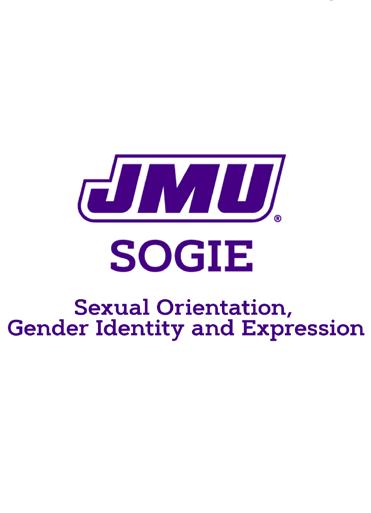


Q: HOw MaNY STUDENTS DO YOU SErvE?
A: The JMU Counseling Center is a very busy place, serving roughly 2,000 students each year, and normally setting a new record each year for the number of clients served.
Q: DO YOU OFFEr vIrTUaL OPTIONS?
A: If a student is unable to visit the Counseling Center for their first visit (e.g. located outside of Rockingham Co., quarantined, registered with the Office of Disability Services as being a student with a health condition that would make a visit with us unsafe) that student can call us (540-568-6552) to complete a phone consultation about recommendations for seeking support services.
“I found it a little difficult to find time for a walkin appointment at the health center because of my busy class schedule. I wish there was an easier way to make appointments online. I was recommended sondermind.com from a friend and their process was super easy and quick. i was able to talk to someone over zoom within a week of joining the site.”
“It was awesome. I had a great experience there, I know a lot of people think that they cap you off at a certain number of visits but they never did that to me. My counselor stayed with me until I was ready to be done.”
“Within the counseling center, I was reached out by the victim advocacy unit after dealing with some unexpected trauma and have continuously been going to them for 8 months. The two victim advocates I have been in contact with have been nothing but helpful. They are gentle, kind, and patient. My counselor has a lot of experience with trauma and provides me with advice to help with my healing. The victim advocacy unit has gone above and beyond my expectations to make my experience with them personal, supportive, and confidential. They have personally reached out to me to give me the opportunity to speak openly and try their best to produce quality care. I am happy with the counseling I have received and encourage students to reach out to the victim advocates if they have experienced sexual violence, relationship abuse, stalking, or others crimes of interpersonal violence.”
Advice from the Associate Director for Administration, Nina H. Critz, LPC
• Speak directly to the student about your concerns, preferably in private.
• Remember, you can rarely go wrong if you approach the student in a caring, concerned way.
• Don’t try to deceive or trick the student into counseling.
• If the student refuses the idea of counseling, it’s usually best not to push.
• Assist the student in coming to see someone at the Counseling Center. You can offer to walk them over and/or provide moral support.
• Because people often mistakenly see coming to counseling as a sign of weakness, frame the decision to seek counseling as a mature choice that suggests that the person is not running away from problems.
• The counseling process is often most difficult at the very beginning, and your encouragement may help to get the student over this initial hurdle.

• Educate the student on the process of counseling.
Scan this QR code for advice on how to address certain behaviors:

T r a n s f e r s / U p p e r c l a s s m e n c a n j u m p r i g h t i n a n d a p p l y t o d a y !
F i r s t y e a r s t u d e n t s s h o u l d k e e p a n e y e o u t f o r t h e 2 0 2 3 - 2 4


R A A p p l i c a t i o n o n D e c e m b e r 1 , 2 0 2 2
j m u . e d u / o r l

@ j m u r e s l i f e
r e s - l i f e @ j m u . e d u

Out of 20,000 students at JMU, only 484 are international students, with 437 of them being undergraduates.
Some criticism that JMU has always faced has been the lack of diversity in its students. According to Data USA, the enrolled JMU student population is 74.7% White, 6.74% Hispanic or Latino, 4.95% Black or African American, 4.63% two or more races, 4.58% Asian, 0.11% American Indian or Alaska Native and 0.101% Native Hawaiian or other Pacific Islanders.
Compared with local students, international students need to spend more time adjusting to their campus life. They come from different countries in the world, have different cultures and speak different languages. While working hard to complete their studies and enjoy campus life, they also bring diverse energy to JMU and new changes.
the Republic of Korea also said. “JMU has a great College of Business and a great community.”
International Student and Scholar Services have given us great help by organizing orientation for us two weeks before the start of the semester, so we can better adapt to and familiarize ourselves with the environment. Linkers are very important at that time. They’re international students who arrived at JMU two years before us, so they know how to quickly integrate us into the campus. They come back to help us after they’ve familiarized themselves with the school environment, so they know better how to guide us and what we really need. They help us with almost everything: how to find classrooms, how to get student cards and even how to buy sheets and quilts.
It really subverted my imagination, because the facilities of this campus have everything we need. It’s not as simple as just a gym or labs for classwork; every school building has direct drinking water, food vending machines and microwave ovens tucked away in the corners. The health center has free hand sanitizer, tissues, lip balm and other health products. The most important part about this campus is that it’s big enough!
Amanda Garbim from Brazil said, “My brother graduated from JMU, and when I first came to this campus, I fell in love.”
The academic atmosphere of JMU is also great. It’s located in the lovely town of Harrisonburg, where there are four beautiful seasons and the surrounding national parks. The quiet and comfortable environment can encourage people to calm down and study hard.
ican corporate culture demands that both parties reach an agreement quickly and accomplish the task.
“I can bring them my view and culture from Asia,” Choi said.
Throughout my whole life, when I’ve eaten out or visited other people’s houses, I’ve always been offered a cup of steaming tea. But in the five years since I came to the United States, I’ve instead been offered ice water.
I like strangers, and I nod when I walk down the road. Someone will generously say that my shoes are beautiful, and my dress looks so nice and even ask where I bought them. But it’s hard to see anything like that happening in the environment I grew up in.
Hello, my name is Liu Jinyi and I’m from the northwest corner of China, a province called Xinjiang, 9,919 miles from JMU’s campus. I struggled to overcome homesickness, language barrier difficulties and learning a completely different way of life.
It’s not just me. I think every international student is kind of the same. We all want to find an area of our own on this campus.
Before I arrived, I didn’t know JMU could be very similar to my hometown. There’s a large temperature difference between day and night, and the natural scenery is also great. In my image, the busyness and indifference of New York, the enthusiasm and freedom of California and the wildness and adventure of Texas are the norm in America. Unexpectedly, this cozy and friendly town captured my heart from the very beginning.
I had no concept of the United States and American universities. Rather than saying that I chose JMU, it was my parents who helped me choose. Compared with other public universities, its tuition is more reasonable, and secondly, JMU has many canteens and tasty food!
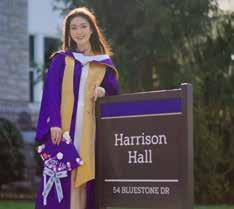
My mom said, “No matter what, you won’t be so homesick when you’re not hungry.”
“JMU is cheaper than others!” Minki Choi from
“When I did the research, I found out that the JMU campus is super pretty,” Nguyen Minh Thu from Vietnam said. “Plus, my major has a good rank, and JMU has a good reputation as well.”
Different cultures collide on campus. They bring new perspectives to class discussions and expose JMU students to cultures elsewhere.
“The most important thing that, as international students, we can bring to campus is diversity,” Minh Thu said. “Universities that bring in foreign students and work hard to foster a culturally diverse campus environment offer students authentic opportunities to learn about themselves and the world they live in.”
One of my most intuitive feelings is when discussing in class, maybe my way and order of thinking are different. For example, I took a French 101 class where I learned about French greetings. It was perhaps too enthusiastic for me, but the Chinese handshake is too formal in daily life. It’s definitely not the same here.
I recall assisting some American students studying Chinese with an assignment on the differences in business culture between China and the United States. I discovered that the Chinese place a higher priority on building connections, whereas the Amer-
The first student organization I joined was the Chinese Students and Scholars Association because it made me feel more comfortable being with Chinese people when my grasp of the English language was weak. In doing that, I also discovered my problem: I started to rely more and more on Chinese translation, and I was reluctant to go out of my comfort zone to overcome the language problem. It wasn’t until I failed a writing class and needed to take an extra semester of language courses that I realized the magnitude of the problem.
Nowadays, I try to go to some environments where I can only communicate with people all in English, such as concerts, movie theaters, churches and football games. Then, I got sick and needed to go to the health center, and I had to search word by word and describe my symptoms and feelings. The doctor’s patience gave me great encouragement. Even though I had absolutely no logic and grammar in my speech, the doctor patiently understood what I wanted to express.
In my second year at JMU, I moved off-campus, and I needed to take an Uber a lot of the time. Every time I got on the bus, the driver would chat with me, such as, “How is the weather? Where am I from? Are there any good restaurants nearby?” In this way, I gradually learned oral expressions, and I’m willing to take the initiative to talk to people. Later, my writing class grade was C+. Although it wasn’t good, I am very grateful to my professor for giving me an F for the first time, as it made me start to change.
Looking back on the past, I feel that I wasted too much time, and missed out on activities and things that I could’ve done with a little more encouragement. I missed the opportunity because I was not confident in myself, so I would like to tell upcoming International students that: We must learn to look at our own strengths and weaknesses objectively, and language has never been a factor that hinders us
from feeling the world. Learning another language is amazing for me, as it makes me feel like I have more ways to learn about the world, and I have an extra chance to meet friends from all over the world.

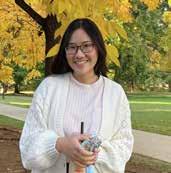
When I’m with my classmates, I usually get pretty quiet because they’re very good at expressing themselves and using their theories to influence others, which is something I’ve had a hard time learn-
ing. Now I have begun to insist on listening to the news and reading more and striving to become wellinformed and knowledgeable. Looking back now, I have only one sentence to say to my former self: “Thank you for not giving up.”


Please enjoy a colorful life without delaying your studies. After all, youth is only once, and such a unique journey.
“THIS JOUrNEY IS NOT E aSY FOr SUrE. BUT, IF YOU arE wILLING TO TakE aLL THESE cHaLLENGES (HOMESIckNESS, L aNGUaGE BarrIEr, aND SO ON), YOU wILL NOT rEGrET IT. aND SOMETIMES, IT ’S E aSIEr THaN YOU THOUGHT. SO, DON’ T BE TOO aFraID E vEN BEFOrE YOU STarT.”
— Minki Choi
“I kNOw THINGS caN BE HarD SOMETIMES BUT STUDYING aBrOaD IS THE GrE aTEST waY FOr YOU TO GrOw aND YOU wILL LOvE IT. BE acTIvE! ParTIcIPaTE IN ScHOOL acTIvITIES, MakE NE w FrIENDS.”
— AbdulRahman Al Bunnia

“OF cOUrSE, YOUr MaIN GOaL IS TO STUDY, TrY YOUr BEST TO GET GOOD GraDES. BUT DON’ T FOrGET TO ENJOY YOUr TIME aS aN INTErNaTIONaL STUDENT aS wELL”

— Amanda Garbim
“GO ON TOUrS wHENE vEr YOU caN. SEE aND LE arN aBOUT aLL THE cOOL PL acES THaT YOU HavE THE OPPOrTUNITY TO SEE aND LE arN. IN MY ExPErIENcE, THIS aLSO rE aLLY HELPED ME TO PrOPErLY HaNDLE MY FEELINGS OF BEING HOMESIck.”
 — Ebenezer Saka Allotey
— Ebenezer Saka Allotey

“THE BEST THING IS TO cOMMUNIcaTE. IF YOU DON’ T kNOw, THEN JUST aSk. IF YOU NEED HELP, LET OTHEr PEOPLE kNOw. ExPrESS YOUr FEELINGS aND aSk FOr HELP arE waYS FOr YOU TO OvErcOME THE HarDEST THINGS. aND JUST rEMEMBEr, YOU arE NOT aLONE.”
— Nguyen Minh Thu
“I waS IN YOUr SHOES Back wHEN I waS IN cOLLEGE. I waS aN INTErNaTIONaL STUDENT MYSELF aND I waNT TO GET TO kNOw YOU aND I caN BarELY E aSILY rEL aTE TO a LOT OF YOUr cONcErNS aND YOUr ISSUES SO I’D LOvE TO GET TO kNOw YOU, MEET YOU, TaLk TO YOU aND HELP YOU IF YOU NEED TO.”

— Lavenir Thomas


For students with a disability, getting the necessary accommodations for each class is important. Luckily, JMU has the Office of Disability Services which does exactly that.
As one of those students, ODS has helped me succeed in my classes throughout my time at JMU. I started out by reaching out to them at their website and registered as a student. They wanted to know what my accommodations were in high school so they knew what would be beneficial.
Due to fine motor control issues, writing is a difficult task for me. When it was time for me to start college, one concern I had was being able to take notes and comprehending a lecture. Fortunately, ODS was able to provide me with two alternatives: a note taker and a SmartPen.
Because of the note taker, I had the ability to listen to the lecture and received notes from a volunteer student anonymously. The SmartPen lets me record my lectures, then download them onto my laptop to review previous lectures. This also helps me focus as well as have a second source if my note taker is absent or if I don’t receive any notes.
Another portion of school that I need some help with is test taking. Taking quizzes and exams in a classroom setting is difficult for me for multiple reasons. I sometimes take longer than the average student when it comes to taking an exam, so I receive extended time — the whole time everyone gets along with half of the duration, which makes me feel less pressure. Along with that, I take it in a small room that helps reduce any distractions that might disrupt me when taking an exam or quiz.
Another accommodation I have is to type any open-ended questions. I have difficulty writing things down like long essays, so this lets me type out what my answer is without having to waste my energy writing out a whole open-ended answer. If typing
isn’t convenient for a certain quiz or exam — like a math exam — ODS lets me use a scribe to help me write out a problem and see it unfold.
While a majority of ODS’ accommodations are academic-based, they do offer some that help students outside of the classroom. An example would be how I get to campus and back home every day. My disability affects my ability to drive a car. Fortunately, JMU is connected to Harrisonburg’s paratransit system, which means I can take a bus to and from school. The bus also assists students that are injured and need transportation help.
Going to college with a disability was more stressful compared to others. Thankfully, the Office of Disability Services was helpful during my transition and my experience at JMU. For more information about the Office of Disability Services, scan this QR code:

Words & Photos by Gracie Brogowski
A: “The Office of Disability Services is the unit that supports students with disabilities. We have a number of programs under our umbrella. And those things include our accessible media team that supports students who need alternatives to print materials or need captions on videos. We also work with students to design accommodations for the classroom, and then letters are shared with professors to help make those accommodations happen. And then, beyond our ordinary programs, our team members participate across campus to help JMU become a more accessible and inclusive university. So, our team members participate on committees and projects across campus. So, we are the students’ resource for discussions of accessibility and accommodation.”
A: “Well, the first thing to know about disability accommodations is that we start with a student. We could talk about some of the common accommodations but the thing to know is that we work with each student and address their needs many times because faculty members do a lot of assessment of learning through exams, it is common for students to ask for
accommodations such as extra time on exams. However, that’s a real rather limited picture because we start with … what is it that the student perceives, they need to request as an accommodation at JMU. So, if a student was to look back at their high school experience and think about things that worked for them in their 504 plan or IEP then they could bring those questions to ODS. We could explore them. But our webpage contains a lot of information about things that students commonly need. Things like paratransit things like classroom accommodations, things like opportunities for sign language interpreters or accessible media. So, I’d say those are some relatively common things that we work on.”
A: “A student is going to go to our website. They’re going to prepare by gathering some documentation about their disability. They’re going to log on to our system called Accommodate. And they’re going to fill out an application that is discussing basic questions about themselves. Who are you? What are you majoring in? What are you requesting? Is it accommodation and they’re going to submit that along with their documentation. Team members are going to review it. And then we would…have a meeting in which we have a conversation with the student and get them set up to begin their working relationship with us.”
Q: wHaT IS SOMETHING YOU wOULD LIkE FrESHMEN TO kNOw aBOUT ODS?

A: “If I’m talking to freshmen, I’d like them to know that it’s important to get started early. They need to know that the process is potentially easier than they perceive it to be to start with. Second, our team members are interested in knowing who they are and setting them up with accommodations that will work for them. And the other thing for freshmen to know is that once they register with ODS, it does not they can choose which classes they asked for accommodations. And this is not an all or nothing kind of thing. So, for example, if a student needs accommodations in history class, but not in their swimming class, you know, they just don’t they don’t have to ask for the same things in every class. So, it really matters that they get started early. And that they think through that they that they began to think through what it is they need and when they when they need to connect with us.”
Schoolcraft also wants students to know about Learning Strategies Instruction. The program is opened to all students and helps them be successful throughout their college experience.
“It is open to all students and they do not need to be registered with ODS to use the services. Many first year students need support in thinking about time management and adapting to managing the college workload,” Schoolcraft stated in an email.



Many college students’ senior year is consumed with capstone projects, upper-level course work and job searches. It can be hard for many to even find time to sleep.
One James Madison University student is using any free time she has to visit hospitals, advocate on Capitol Hill and raise awareness for childhood cancer.
LeAnna Headley is a senior at JMU and started Our Amazing Fighters (OAF) in 2014. OAF is a nonprofit whose mission is to raise awareness and spread joy to kids and their families in the fight against pediatric cancer.
“My goal with Our Amazing Fighters is to love families in the fight well and to actually build relationships with them that go beyond their cancer battle,” Headley said.
The nonprofit began as a social media page, but Headley decided to do something more tangible for the families by establishing the organization.
“I had followed some kids on Instagram who were fighting pediatric cancer and really began to learn just the devastating reality that these kids face and I wanted to do something,” Headley said.
She hopes that telling the stories of kids suffering with cancer will help create policy in Congress to allocate more funding and research toward pediatric cancer. According to the American Childhood Cancer Organization, only 4% of the National Cancer Institute’s budget is dedicated to childhood cancers.
“I truly believe that children are our future,” Headley said. “They deserve a chance to grow up and we’re not giving them that opportunity.”
Headley has lobbied on Capitol Hill over 25 times and campaigned for several notable acts including the Research to Accelerate Cures and Equity (RACE) for Children Act. This act requires companies developing cancer drugs for adults to also establish pediatric study plans for those drugs.
OAF helps hundreds of kids each year by sending out bald American Girl dolls, customized blankets and care packages catered to each kid. The children fill out an application on OAF’s website listing their hobbies and favorite snacks, so the care packages can be as personalized as possible.

“I really wanted something to just bring the kids a little bit of joy because the journey can be really, really dark,” said Headley. “To provide a smile for one ounce of a second can sometimes brighten a whole day.”
Each of the kids’ siblings also receive a care package.
“We began to learn that the siblings were the most overlooked group in the childhood cancer world,” Headley said. “They suffer so many of the non-medical side effects of cancer like mental or emotional distress.”
With the help of OAF ambassadors, Headley delivers coffee or meals to loved ones while they wait at the hospital. Each ambassador lives in a differ-
ent part of the United States to maximize the nonprofit’s effect.
Headley decided to bring the advocacy and awareness to the Friendly City by starting Dukes Against Childhood Cancer (DACC). She began this club alongside JMU student and cancer survivor Caroline Laughorn.
“LeAnna would obviously be the perfect person to help me with that,” Laughorn said as she recalled her first time mentioning the idea of DACC to Headley back in 2020.
Headley connected with Laughorn in the pediatric cancer world after delivering a care package to Duke Hospital. At that time, Laughorn had relapsed for the third time and was waiting to start her freshman year at JMU.
“It was a really beautiful connection,” Headley said. “I already had the passion for pediatric cancer and through my organization I had met Caroline and wanted to do something together.”
As a four-time leukemia survivor, Laughorn said she’s grateful for Headley and her advocacy.
“I think it’s amazing how she has such a passion for fighting for this cause,” Laughorn said.
Headley has gained support for DACC from Nick Langridge, JMU’s vice president of university advancement.
“I get so excited in watching students find meaning and purpose in organizations like Dukes Against Childhood Cancer because I know what this means for the rest of their lives,” Langridge said. “They’ve tasted what meaningful work can be like.”
Langridge met Headley through her father Ken, who served as the president of the JMU Alumni Association Richmond chapter at the time.
Being in the childhood cancer space for many

“I rE aLLY waNTED SOMETHING TO JUST BrING THE kIDS a LITTLE BIT OF JOY BEcaUSE THE JOUrNEY caN BE rE aLLY, rE aLLY Dark. TO PrOvIDE a SMILE FOr ONE OUNcE OF a SEcOND caN SOMETIMES BrIGHTEN a wHOLE DaY.”
-LE aNNa HE aDLEYHeadley assembling care packages to send to kids as part of her nonprofit Our Amazing Fighters.
years, Headley was not shy about the devastation cancer can bring. However, the hurt hit a lot closer to home when her father passed away in November 2020 following his four-year battle with glioblastoma.


“Ken was just one of those people who brought such energy into the room, made everyone feel so important and cared for,” Langridge said. “She [LeAnna] had that same light — bright light — that Ken brought to the room.”
Langridge has helped Headley connect with kids battling cancer, including his own family friends.
At the beginning of the pandemic, a family moved in next door to Langridge with children that were the same age as his own. Shortly after the relationship blossomed, one of the neighbor’s children developed a brain tumor.
“It was all happening in a synchronous way,” Langridge said. “I’m seeing firsthand in my community — this young boy dealing with something so traumatic ... and now I’m witnessing students, especially LeAnna, wanting to reach out and care.”
Headley is decorated with around 300 bracelets symbolizing a child she’s helped in the fight. Some feature the hashtag representing the child’s battle, while others remind her to pray.
“They are truly one of my most prized possessions,” Headley said. “I really think
they show just how many kids are impacted by the disease and I only have a fraction of them. It’s a powerful reminder of how we desperately need to care for each one of those kiddos.”
As she looks down to her wrist at the bracelets, she is also reminded of the kids that lost their lives in the fight.
According to the American Cancer Society, after accidents, cancer is the second leading cause of death in children ages one to 14. The organization estimates that about 1,050 children under the age of 15 are expected to die from cancer in 2022.
“We lose kids far too often; it’s so unfair, and they deserve to grow up and to live long and beautiful lives,” Headley said. “It breaks my heart on so many levels and I’ve had to attend far too many funerals for kids that I know and love.”
Despite all the losses Headley’s encountered during her advocacy, she’s gained so much more.
“I have met some of my best friends through my nonprofit and I have found my purpose and my passions in life because of it,” Headley said. “It has provided me with so many wonderful opportunities that I would have never otherwise gotten.”
Words by Shelby Walker
Photos by Maria Copeland & courtesy of LeAnna Headley Headley poses with kids that she has helped in their cancer battle. Top: Charlie & LeAnna, Bottom (from left to right): Charlie, LeAnna, Kimber and Caoilinn.


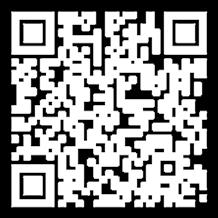
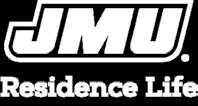

“There is not one week where I don’t walk into SSC. Where I don’t study in SSC or take time to meet up with friends or use the resources available there.”


“On a nice day, nothing can beat the quad. You’ve got the wind in your hair, the sun on your skin, and there’s a cute dog somewhere nearby.”

“My favorite view on campus is right outside of Carrier, between Carrier and Keezel, if you’re looking out towards the quad you see all the terracotta roofs and the mountains behind campus.”














“The village is like a center point of campus - you have easy access to east and main campus. That extra common space and having more people to live with was like the typical college dorm experience.”
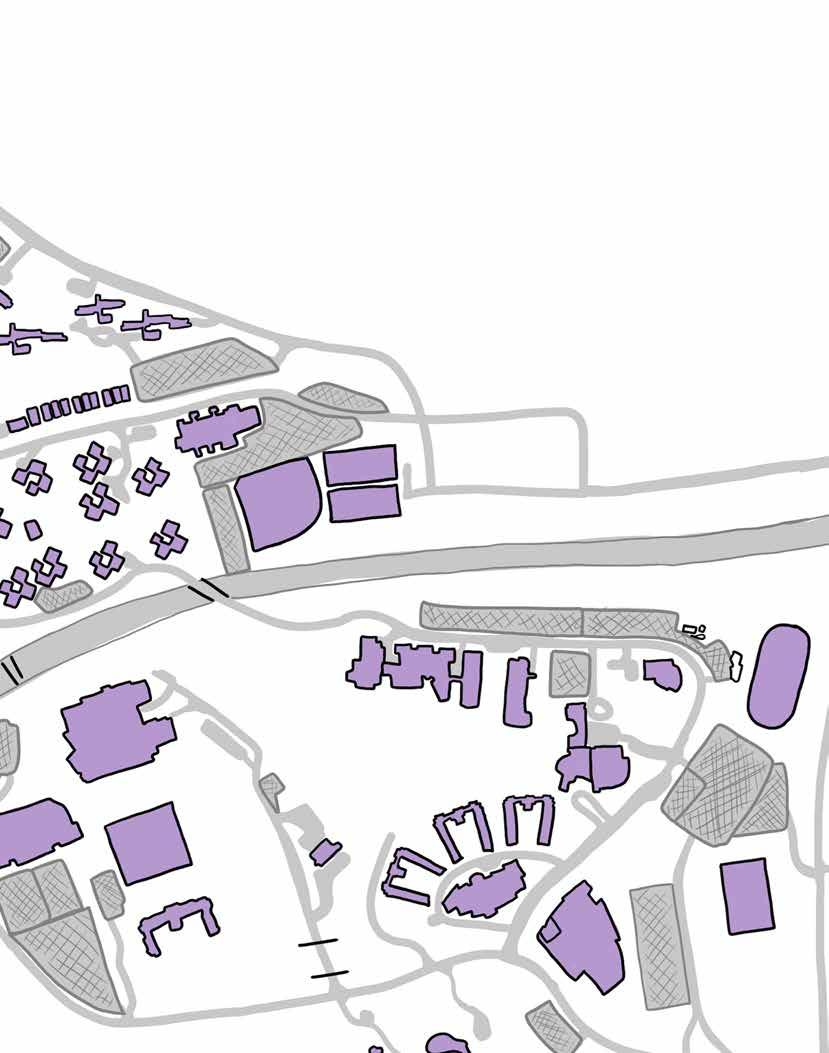
“The best dorm on campus is Jennings Hall…it’s like a hotel. It has all the amenities and it’s really nice.”
“Shenandoah Hall is my favorite dorm. I had all of my classes on main and then I would come back to east and it felt like I was getting away from everything, taking a break and relaxing.”
On a sunny Monday morning, JMU Communication Studies professor Lori Britt and freshman architectural design major McKenzie Ashe catch up in Britt’s office. Both greet each other with a warm hug. Britt has a wide smile as she catches up with her former student.
“I had just run into McKenzie, and didn’t even know she was back on campus [from winter break],” Britt said. “I was so thrilled.”
For incoming students, making the transition into college can be tough, along with balancing classes, activities and a social life. Some students may feel they need extra support from someone that isn’t their family or friends, but rather a professor in a class they are struggling in. A teacher and student academic relationship can allow both parties to learn and grow from each other.
Ashe was introduced to Britt when she took SCOM 123, the introductory general education course JMU offers for incoming students. The course focuses on human communication in small groups and public communication contexts; which Britt said she made her first notice of Ashe when she sat in the front of the class and volunteered herself in an introductory activity involving speaking in groups.
“I always love a student who will sit up front and who will answer questions in the beginning,” Britt said. “[Ashe] just asked great questions and stayed in great communication with me.”
Although Ashe said most of her professors were understanding and formed different academic relationships with each of them, Britt was a “cool”
professor that caught her eye based on the way she dressed and how she spoke while teaching the class.
“From the way she was speaking I was so engaged in her class,” Ashe said. “It was not boring at all.”
During Ashe’s first semester at JMU, she was met with struggles going on in her personal life, which in turn impacted her coursework in Britt’s class. Instead of criticizing Ashe for not doing well in her class, the two reached a conclusion: Professor Britt would help Ashe succeed in her other classes while figuring out how she could retake the SCOM 123 course the following semester. Britt said she frequently reached out to Ashe via email when she noticed she was missing from class, and invited her to talk to her privately in Britt’s office. Britt said taking an interest in what brought Ashe joy: art, helped them form a closer academic bond.
“It’s really important that we talk to students as full human beings, and we don’t expect that they’re going to be able to succeed at everything right away,” Britt said. “There’s a lot of pressure we know nothing about, and just taking the time to let people talk about what’s going on in their lives is sometimes what they need the most.”
Britt said that professors should help those students with taking care of their mental and physical health, while also encouraging them not to give up on themselves. This could start by asking what the student is struggling with and listening to them. She said academic struggles are often related to deeper challenges and the best way to help students is to provide a space where they can feel comfortable
sharing their thoughts without feeling judged.
“I think we need to help students understand how we have those conversations and it is nothing that is in any way a mark on who they are or who they will eventually become,” Britt said. “It’s simply making a good decision at the moment.”
For upcoming students that may be in Ashe’s shoes their first semester, her advice is to prioritize mental health.
“Like Dr. Britt said, you don’t have to give up and you don’t have to feel like you’ve failed,” Ashe said. “I just had to take time to myself to realize that it was too much for me at the time, but later on I’ll probably be able to take it on.”
In Britt’s classes, she said it’s important for incoming and current students to attend her lectures and to prioritize their attendance in their other courses. The material in in-person courses are “brought to life,” she said, and can be applied to a student’s current and future life.
“I see the pattern of students thinking that they just simply don’t have to go to class and that that’s not where learning happens,” Britt said. “That’s where such a fundamental part of learning happens.”
Ashe said her learning style is having “things in her hand,” such as taking notes with a pencil on paper as opposed to typing them on a computer. She said she encourages other students to find their own learning style so they can do well in their courses.
“Learning what your own learning style is and your own boundaries when it comes to your education is very important,” Ashe said. “If you’re going to class and you’re still sitting in the back of the classroom, you’re not going to get the same kind of education that you would otherwise.”
As for the bond that the two share, Ashe said it’s important for students to form academic relationships with their professors — it can be an “extra support” for students. Communication with professors is something Ashe said is “key” for both students and professors to create a professional relationship with each other.
“If you can’t just talk to the person who controls your grades and the person who assigned you things and will give you extended vacations,” Ashe said, “they’re never gonna get the same experience as someone who’s in communication with [professors].”
Britt said this kind of relationship can help a student realize struggles they may have with a particular way a professor teaches, and can allow students to work to succeed with them in different ways.
“I think you get that individual attention when you reach out and have a relationship with your professor,” Britt said. “We’re giving you other ways to show that you are interested in the material and we see it [being] valuable in your life.”

“GOING TO cL aSS IS THE E aSIEST waY TO PaSS.”
— Emily Conroy, Senior Media Arts and Design Major
“EvEN wHEN YOU DON’ T waNT TO GET UP TO GO TO THOSE E arLY cL aSSES, YOU JUST HavE TO PUSH!”
— Clark Moeller, Alum Double Major in Media Arts and Design and Political Science
“SUrrOUND YOUrSELF wITH PaSSIONaTE aND MOTIvaTED PEOPLE TO HELP UPLIFT YOU!”
— Maddy Botts, Senior Social Work Major
“GET INvOLvED! EvEN IF IT ’S SOMETHING YOU’vE NE vEr DONE BEFOrE.”
— Rebecca Gerrior, Junior Communications and Sciences Disorders Major
“TaLk TO YOUr ra wHEN YOU arE STrUGGLING IN cL aSSES. wHILE THEY MIGHT HavE TakEN THE cL aSS, THEY SHOULD BE aBLE TO HELP YOU cONNEcT wITH PEOPLE wHO caN HELP! ra’S arE STUDENTS TOO aND THEY HavE TIPS aND TrIckS FOr a SUccESSFUL SEMESTEr!”
— Madison Gregory, Senior Biology Major with Secondary Education Minor
“MakING rE aL cONNEcTIONS wITH YOUr PrOFESSOrS IS SO HELPFUL ESPEcIaLLY IN HarD cL aSSES!”
— Grace Bailey, Senior Intelligence Analysis and Independent Scholars Double Major
“OrGaNIzE STUDY GrOUPS wITH FrIENDS. USE THOSE wHITE BOarDS IN carrIEr TOO!”
— Kamryn Koch, Senior Media Arts and Design Major
“cOME TO cL aSS. GET TO kNOw YOUr cL aSSMaTES. GET TO kNOw YOUr PrOFESSOrS. STaY cONNEcTED!”
— Minah Oh, Associate Mathematics Professor
“NE vEr BE aFraID TO aSk FOr HELP Or aDMIT YOU DON’T UNDErSTaND SOMETHING. IT ’S NOT a SIGN OF wE akNESS, IT ’S a SIGN OF wISDOM.”
— Alan Levinovitz, Associate Professor of Religion
“GO TO OFFIcE HOUrS! IT ’S IMPOrTaNT TO DE vELOP PErSONaL cONNEcTIONS wITH YOUr PrOFESSOrS aND SEEk THEM OUT aFTEr YOU’vE aTTENDED a LEcTUrE aND DONE THE rE aDING. YOU wON’ T UNDErSTaND aLL THE MaTErIaL ON YOUr OwN – YOU’rE NOT MEaNT TO -- BUT wE’rE HErE TO aNSwEr QUESTIONS aND cHaLLENGE YOU. TakING a PaSSIvE aPPrOacH TO YOUr EDUcaTION wILL YIELD SUBOPTIMaL OUTcOMES. GO FOr BrOkE!”
— Gregg Wrenn, Assistant Professor of English
“a SMarT PErSON rE acHES OUT FOr HELP aFTEr THEY MakE a MISTakE. a wISE PErSON rE acHES OUT BEFOrE THaT MISTakE.”
— David Daniel, Psychology Professor
“FIND OFFIcE HOUrS, IN PErSON Or ONLINE, Or SPE ak TO YOUr INSTrUcTOr aFTEr cL aSS. THaT rEL aTIONSHIP NEEDS TO STarT E arLY IN THE SEMESTEr SO IT ’S THErE wHEN OUr STUDENTS NEED ExTra HELP Or aFFIrMaTION.”
— Karina Kline-Gabel, Lecturer in Foreign Languages, Literatures and Cultures
“cUT OUT THE DISTracTIONS wHEN YOU arE rEaDING, wrITING, aND STUDYING. TUrN OFF NOTIFIcaTIONS ON YOUr PHONE, Or BETTEr YET, PUT YOUr PHONE IN aNOTHEr rOOM.”
— Dolores Flamiano, Media Arts and Design Professor

“IT IS IMPOrTaNT TO BE cUrIOUS aND OPEN TO NE w IDE aS aND ExPErIENcES, TO LET YOUrSELF BE cHaLLENGED aND UNDErSTaND THaT YOU wILL FaLTEr aT TIMES. aT THE SaME TIME, I’D SaY TO BE MINDFUL OF THE kIND OF HaBITS YOU STarT FOrMING, THE kIND OF PEOPLE YOU SUrrOUND YOUrSELF wITH, aND THE kIND OF cOMMITMENTS YOU MakE. LaSTLY, I’D aDD NOT TO BE aFraID OF rE acHING OUT TO YOUr PrOFESSOrS. aS INSTrUcTOrS, wE arE HErE TO HELP YOU LE arN.”
— Michael Trocchia, Philosophy Professor
JMU students will hear these names tossed around as often as a frisbee on the Quad. It’s important to know these prominent figures within the JMU community and who you can go to for assistance.
While he’s not in meetings about important decisions regarding the university, President Jonathan Alger is connecting with JMU students.
Alger said it is important for students to build relationships with faculty and staff because it allows them to accomplish dreams they never thought were possible.
“It’s through those relationships that students get inspired, they get pushed and encouraged to be their
You can typically catch Vice President for Student Affairs Tim Miller on social media, community events or having lunch with students at D-hall.
Miller’s not only responsible for managing dayto-day tasks within student affairs, but also longterm strategic plans for the JMU community. His main priority, however, is interacting with students.


“The students are my passion and my job,” Miller said.
Miller said it’s his responsibility to connect with
best selves to realize their full potential,” Alger said.
Alger said the best way to build relationships at JMU is to be present.
“If we are all fully present in the environment, that allows us to see those possibilities and seize them,” Alger said.
Alger said he welcomes all students to visit the President’s Office and share their ideas for events, activities and ways to improve life at the university.
students as much as possible, so he can know what they need and advocate for them.
“I don’t think I’d be doing my job if I didn’t spend the amount of time I did with students,” Miller said.
He’s a JMU graduate and said there is no other place he’d rather be than at his alma mater.
“I am in my dream job at my favorite place on Earth,” Miller said.
Brent Lewis oversees the Center for Multicultural Student Services (CMSS), Office of Disability Services (ODS) as well as Sexual Orientation, Gender Identity and Expression (SOGIE).

“I see myself as a liaison between JMU administration and students, related to diversity, equity and inclusion,” Lewis said.
Not only does he help guide students that are a part of minority communities on campus, but he helps students not a part of those communities learn about individuals who’ve had different experiences than them.
“We are preparing citizens to be enlightened,” Lewis said. “I see my role as integral to your college experience so that you are exposed to new ideas, new perspectives, exposed to diverse ways of engaging across multiple identities.”
Lewis encourages all students to look for the resources that they need in order to be successful.
“College is a melting pot and everyone will find their sense of belonging in a different way,” Lewis said. “I am happy to engage all students to make sure that you know what exists.”
With JMU Athletics’ move to the Sun Belt Conference, Jeff Bourne has been busy making sure student athletes are a priority.
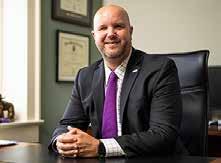
He said he has two main goals as the director of athletics. One is for every student athlete to compete in a conference championship at least once during their time at JMU. The other is to prepare them to be leaders in their communities.

Bourne is not alone in his efforts. He’s joined by athletic trainers, academic tutors, sports psychologists and more.
“There’s a really large network around a student athlete to help them be successful,” Bourne said. “We have an open-door policy for students and if there is something we can do to help them we do that.”
Bourne hopes that all student athletes will reach out if they need assistance.
“I encourage every student athlete to maximize their opportunity,” Bourne said. “You often fail to look around and take advantage of everything that’s there for you and you don’t realize that sometimes until you’re gone.”
Art Dean wears many hats at the university, including the Executive Director for Campus and Community Access and Inclusion. His job entails connecting students to resources at the university which include academics, counseling or other support services they may need.
Dean attended JMU and said he was hesitant as a freshman to reach out for assistance or guidance. Dean’s advice for students is to talk to someone you feel comfortable with, even if they’re outside your circle of influence.
“It’s okay to find your niche in different places,” Dean said. “But wherever you feel connected, wherever you feel there’s the opportunity, use it.”
He also encourages students to learn about the different resources on campus and take advantage of the relationships they can build while at JMU.
Like Miller, Dean enjoys interacting with students and encourages all to reach out.
“You don’t realize just being in the same space where students are, how important that is,” Dean said. “To me, that’s what it’s all about.”
arT DEaN, ExEcUTIvE DIrEcTOr - caMPUS aND cOMMUNITY accESS aND INcLUSION JEFF BOUrNE, DIrEcTOr OF aTHLETIcS JONaTHaN aLGEr, PrESIDENT TIM MILLEr, vIcE PrESIDENT FOr STUDENT aFFaIrSThe sticker is displayed by a network of voluntarily trained faculty, staff, and students who are committed to providing an atmosphere of acceptance and assistance for the LGBTQ+ community here at JMU, as well as providing a space where you can feel comfortable coming and being out, or sharing what’s on your mind.
Visit jmu.edu/safezone for more information


Shenandoah Valley Airport (SHD) is located just 15 minutes from campus and offers competitive fares with global connections. Use the airport shuttle or take advantage of FREE parking while you travel. FlySHD.com




#Fly Go Dukes!

Within the past couple of years, the awareness surrounding voting and voter education has become an important part of our society. Voting in college can seem daunting, and that’s why Dukes Vote is here.
Dukes Vote is a student-led organization supported by JMU’s Center for Civic Engagement. They’re focused on educating students on how, where and who to vote for during each election cycle.
Voter turnout nationwide has seen a significant increase between the 2016 and 2020 presidential elections, and so has Dukes Vote. Dr. Carah Ong Whaley, associate director for civic engagement, said she’s seen an increase in student participation within her four years at JMU.

“My first year here we had our first voter education and engagement plan and started implementing it,” Whaley said. “We went from an 8.8% turnout in 2014 to 32.8% in 2018, so that was a 300% increase just in the first year.”
Employees like Whaley are determined to register student voters in Harrisonburg.
“We registered 92% of our students to vote for the 2020 presidential election,” Whaley said. Students that are living on-campus can register to vote through Dukes Vote, and those who are registered elsewhere can
change their voting location. Dukes Vote and the Center for Civic Engagement provide transportation to an on-campus voting location for students registered in Harrisonburg.

“There are a lot of advantages to voting here. It’s a lot more accessible, but some people feel very connected to wherever their parents may be,” Whaley said. “It would be best to direct everyone to our FAQs on jmu.edu/vote.”
Dukes Vote is also full of opportunities for new and returning students to get involved. Whaley said that all students currently working with the organization have been with them since their freshman year.
“Most people that start with us tend to stay with us because they’re passionate about the cause,” Whaley said.
Not only does Whaley encourage students to get involved, but she also recommends that students apply to become an election officer. Election officers help set up the polling location, handle ballots and check voters in. It’s a paid opportunity, and students who are chosen to be election officers often get the day off class.
JMU also has two other politically affiliated student-led organizations: College Republicans and College Democrats. Both organizations work with Dukes Vote to educate JMU’s students and help them get to the polls.
Juliana McGrath, Chairwoman of College Republicans, plans all the organization’s weekly meetings and works to provide prominent guest speakers to talk to students informally.
“We usually have guest speakers at the meet-
ings to get the JMU and Harrisonburg community engaged,” McGrath said. “I work to get candidates from different offices, our current representatives, school board members and city council members to forge that relationship.”
College Republicans hosts open meetings every Monday night and encourages students of all political affiliations to join and learn something new. They host their own voter registration drives during each election cycle, and frequently set up tables on the Quad with different literature pertaining to each candidate that’s running.
Similar to College Republicans, College Democrats also focus on political engagement and education among JMU students.
Gia Yoder, the President of College Democrats, is responsible for organizing and executing all the organization’s meetings. She joined the club in January of 2021 and is focused on providing opportunities for new and old students to get involved.
“In Spring of 2021 all of the gubernatorial candidates spoke and then in the following Fall we had local delegate candidates come in to speak about work on their campaigns as well,” Yoder said.
College Democrats meet every Wednesday night and encourage freshmen to come and learn more about their organization. They host meetings with guest speakers, including current, past and hopeful politicians.
They also set up tables on campus leading up to elections and knock-on students’ doors to remind them to vote.
“We even send out postcards asking if they have a plan to vote or if they know where their polling location is,” Yoder said.
Grayson Fontaine, the vice president of College Democrats, has worked with Dukes Vote directly to help get students registered to vote, whether it’s in Harrisonburg or at home.
“Us and Dukes Vote have the same goal: to register people to vote,” Fontaine said.
Getting involved politically through Dukes Vote, College Republicans and College Democrats can help ease the stress of voting via absentee ballot or not voting at all. Not only can getting involved help shape your JMU experience, but it can help you learn more about our democracy and how you can stay involved.
“ wE rEGISTErED 92% OF OUr STUDENTS TO vOTE FOr THE 2020 PrESIDENTIaL ELEcTION”
- Dr. caraH ONG wHaLEYVoting has significantly increased among JMU students Dr. Carah Ong Whaley, Associate Director of Civic Engagement.
As the student body president and student representative to the Board of Visitors (BOV) — two of the most essential positions in SGA — Shawdee Bakhtiari and Xaiver Williams are names that every JMU student needs to know.

Bakhtiari is a senior political science major who has been a member of SGA since the fall semester of her freshman year. She has been a Senator-at-Large and an Executive Assistant, which is an auxiliary leadership role where she was able to witness “behind-the-scenes” things that many students don’t get the opportunity to see.
Williams is a music education major — a rare but welcome major in SGA — and is now in his second term in this position. He said when he told the BOV his major, they told him that he may have been the first representative to be a music major.
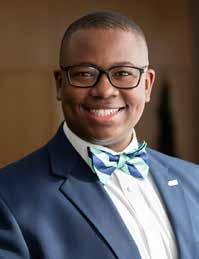
“A lot of people looked at me and were like, ‘You’re not political science?’” Williams said. “Let’s not look at barriers just in race, let’s not look at
barriers just in gender, but let’s look at barriers within fields of study.”
The President has many duties, including but not limited to: relaying student concerns to the JMU administration and overseeing all SGA activities and inquiries, presiding as chairperson of the Executive Council and of the Student Government Leadership meetings, delegating tasks when needed to the Executive Assistant and supervising and meeting regularly with both the Executive Assistant and the Communications Director, according to SGA’s website.
The role of the Representative is to “represent the student voice to the governing board on issues when it comes to tuition and fees, approving new majors [and] strategic future planning for the university,” Williams said.
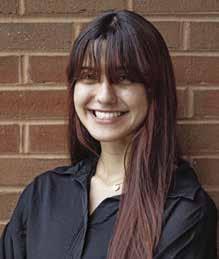
Bakhtiari and Williams actually go way back: They lived in the same dorm freshman year.
“I told her to enjoy time now because once you’re student body president, the work starts immediately,”
Williams said.
As president, Bakhtiari said one of her main goals is to “do what she can to amplify underrepresented voices.”
“I want to see diversity on campus in an organic way,” Bakhtiari said. “Inclusion of diversity should come naturally.”
She said she would never have dreamed about being president in high school or as a freshman, saying she used to be “mortified” to do anything freshman year.
“I would’ve thought it was a pipe dream,” Bakhtiari said. “I didn’t see my own potential, so I thought others wouldn’t either.”
Bakhtiari said she wants to tell freshmen not to be afraid to push
the boundaries of their comfort zone and not to feel any pressure of being judged.
“If it doesn’t work out, it doesn’t work out,” Bakhtiari said. “Your experience in college is what you make of it.”
Williams has three pieces of advice for freshmen: Don’t be afraid to ask questions, get involved and be yourself.
“University is where you develop who you are,” Williams said. “If people cannot accept you for who you are, they don’t deserve to be in your circle.”
“I waNT TO SEE DIvErSITY ON caMPUS IN aN OrGaNIc waY. INcLUSION OF DIvErSITY SHOULD cOME NaTUraLLY.”
— SHawDEE BakHTIarIXaiver Williams at the 2020 Graduation Ceremony with (from left to right) Deborah Tompkins Johnson, President Jonathan Alger and Lara Major. Xaiver Williams Shawdee Bakhtiari
Many history professors never imagine they’ll experience events of the past they study within their own lifetimes, but that’s exactly what happened to Dr. Margaret Mulrooney in April of 2020.
As the self-proclaimed “primary campus historian,” Professor Mulrooney is an expert on campus history. This means she was already aware of the closure at JMU — then State Normal and Industrial School for Women — due to the 1918 influenza pandemic, commonly referred to as the “Spanish Flu.”
“Because of my administrative role, I was in meetings where people were talking about, ‘What are we going to do? How are we going to resolve this?’” Mulrooney said. “So, I thought, ‘Oh I’m gonna go back and see what I can find out and understand.’”
What she found was that despite a century between them, the people of 1918 were not all that different from those who faced the COVID-19 pandemic at JMU today.
In a blog post, Mulrooney talks about how the 1918 fall semester began normally, with students crowding into the Bluestone dorms, dining hall and library. Students attended a formal welcome gathering where President Burruss gave a speech, and they sang the school songs. She says the first case of influenza appeared on Sept. 28.

The headline of the Daily News Record on Oct. 8, 1918 announced the official closing of the school, along with the statewide banning of all public gatherings and closing of public places. Mulrooney references a cartoon in her post that suggests that students back then wore masks and practiced social distancing similar to today.
The Burruss and Alger administrations faced similar pressures
when it came to deciding whether to close the school and when to reopen.
“They can’t just make that decision in a vacuum,” Mulrooney said. “They have to think about the bigger context about Harrisonburg, our local community and then also the state.”
Both administrations didn’t want to pause their students’ learning frivolously, but also realized their was at stake. Local shops in both times were pushing for life to get back to normal so they could stay in business.
“You could see that they were wrestling with those same kinds of questions,” Mulrooney said.
According to the University of Michigan’s Influenza Encyclopedia, the ban on public gatherings was lifted on Nov. 6, 1918, after many discussions with contrasting opinions. However, like today, there was a second wave causing the cases to reach near the epidemic level again in December.
The most notable difference between these two events is their scale. The 1918 influenza pandemic closed the school for one month, while
COVID-19 has affected JMU’s way of life for almost two years.
While it’s not possible to know the exact opinions of students back in 1918, it appears they came back to the university with an attempt at lightheartedness, Mulrooney said. She references a poem in her blog post that was written by a student upon returning to campus in 1918. It was titled, “The Flu” and written by Virginia Zirkle.
“The flu came to the Normal once, and Oh, my lawzy-daisy; all the folks around the place, were jist a-runnin’ crazy [sic],” Zirkle wrote.
Due to the way the pandemic shifted every JMU student’s life in some capacity, their reactions were much less humorous.
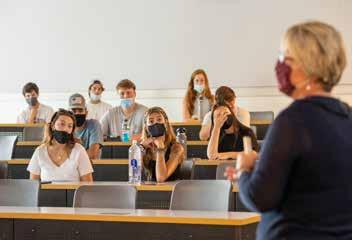
“Honestly, it would have been better without COVID just because it was easier to have classes online,” senior Dania Najjar said. “But I just missed out on a lot of opportunities, and my mental health tanked.”
A positive impact from the 1918 pandemic was that it highlighted the need for certain fields, such as teaching and health professions. As
Mulrooney mentions in her blog post, this is what pushed the Normal School into prioritizing these professions and planted the seeds for Madison College.
Mulrooney was cautionary, however, in students fully repeating history from over 100 years ago. She hopes the female members of the student body will take advantage of these highly-gendered fields but also seize new opportunities in other fields that have been highlighted during the COVID-19 pandemic.
“Women still don’t have equity in the workforce … I hope that our women students will also be pursuing some of the more high tech kinds of professions that have also been accelerating,” Mulrooney said. “There’s so many other things that we have demonstrated we need for qualified personnel.”
One way history tends to repeat itself is through the reminder that society has progressed forward after every tragedy, Mulrooney said.
While the pandemic has been devastating, it’s taught us lessons and caused our society to think in new ways, Mulrooney said, like after the 1918 pandemic — o the most important being the way we use technology.
“The faculty did heroic things in an emergency; the question is, what would it look like now to do it intentionally?” Mulrooney said.
Campus is beginning to return to pre-pandemic standards, with the majority of classes in-person and masks becoming optional. As the university begins to recover, only time will tell what’s been learned from the pandemic and if JMU has changed for the better.
Words by Sarah Connor
Dukes may hold doors, and JMU may be considered by some as a “party” school — a school well known for hosting engaging activities at off-campus residences — but students who’d rather not spend their weekend clutching red Solo Cups or trekking between off-campus parties have more options than they might expect.
Between the endless, towering mountains and hiking trails on the circumference of the Shenandoah Valley and the rustic small businesses of downtown Harrisonburg, the area has plenty of recreational options for students looking to do something fun on the weekends that isn’t drinking- or partyrelated. There are a plethora of sober activities for students to participate in. Here are a few:

Whether you’re looking to window shop, actually shop or just explore new and novel stores, downtown Harrisonburg holds some of the city’s most well-known and popular places to visit. Within the numerous restaurants and vintage-inspired antique stores, there are several niche, interest-specific stores — skateboard and music fanatics should visit Wonder, and video game fans should visit Gamer Oasis.
For those interested in art, OASIS Fine Art & Craft showcases artwork from a blend of local artists to view and purchase. For boutique lovers, downtown Harrisonburg has several well-known options, including The Yellow Button, Charlee Rose Boutique and Bluetique — all offering wide assortments of clothing and accessories. There’s enough of a variety for those strolling through downtown Harrisonburg to keep themselves busy and find something new to enjoy each time they visit.
Just 20 minutes outside of JMU, buried amid the mountains, Massanutten Resort offers an assortment of activities for locals to engage in. Amenities include an indoor and outdoor waterpark, golf, fishing, hiking, horseback riding, escape rooms and other sport activities to join.
Massanutten Resort is well-known for its se-


lection of snow sports — visitors can trek through snowy mountains at select times of the year to ski, snow tube or ice skate. More information on rates for day passes, season passes and selecting time slots for each activity can be found on the resort’s website.
Though there are fun activity options for JMU students in the area, Harrisonburg is central enough in distance to travel to neighboring towns and cities for day and weekend trips. The city is about 30 minutes from Staunton, an hour from Charlottesville, and roughly two hours from Richmond — all of which are in Virginia — and Washington, D.C., and these places are all perfect in distance for a fun-filled day trip or an adventure-packed weekend-long stay. Fulfill a curious, explorative side of yourself and find your new favorite places in these nearby towns.

Harrisonburg is home to a selection of coffee, tea and specialty drink places. Stray from an easyto-grab Starbucks or Dunkin’ to-go cups and spend the day finding your favorite, delicious caffeinated brew and comfortable lounge spot. Places like Black Sheep, Shenandoah Joe, Merge and grace+main are popular relax-and-sip spots among locals, kickstarting a tea time tour and coffee escapade around the ‘Burg.
Several quaint, hole-in-the-wall breakfast spots reside in the Harrisonburg area. Create a brunch bracket with a few friends, and spend time testing out your favorite restaurants to find an ultimate brunch champion. Here are a few places to get your bracket started.
Magpie
Magpie opened its doors to Harrisonburg in 2020, and a line for seating often begins before the breakfast and lunch restaurant opens for the day — especially on the weekends. Its unique menu options and weekly randomized menus have made it a popular local spot.
Along with classic breakfast options that stay on the menu each week, such as eggs, bacon, pancakes, waffles and breakfast sandwiches, the rotating
weekend brunch menu features varied favorites. The Green Poutine, a vegetarian-friendly dish, has arugula, a fried egg and herb sauce layered on a bed of potatoes and topped with everything bagel seasoning. The cinnamon swirl french toast is topped with a whipped cinnamon-sugar butter and maple syrup.
Thunderbird Cafe
Fifteen minutes outside of JMU, on the outskirts of Massanutten Resort, Thunderbird Cafe is a southern-inspired diner with a variety of breakfast and lunch options. In 2017, Thunderbird Cafe was nationally recognized as one of the South’s best diners in Southern Living Magazine. Its pancake tacos are pancakes stuffed with cream cheese folded into a taco shape and topped with a “topping of the week,” and the Wild Wing Waffle is a waffle topped with fried chicken, buffalo sauce and a maple-honey glaze. All of the omelets, including a create-yourown option, some with sides of fried potatoes or grits and a choice of a buttermilk biscuit or toast.
For freshmen who live on campus, every day they hear the hourly bell ding from the clock tower on Main Campus — a bolstering ding that rings for each individual hour number it is — prefaced by a short and sweet eight-note melody. At 12 p.m., the JMU anthem that sings from the tower at 12 p.m., and at 5 p.m., passersby will hear the alma mater ring out. Those in the area can also enjoy some off-campus tunes at local restaurants — Clementine Cafe and The Golden Pony are two downtown Harrisonburg spots that frequently host live music events.
Whether it’s at the Forbes Center for the Performing Arts or Court Square Theater, Harrisonburg residents can enjoy an array of live performances at each. The Forbes Center offers live stage productions — some being JMU student-led productions— and music and dance performances; Court Square Theater offers live performances, such as concerts and comedy acts, and varieties of movie showings. More information about specific events coming up and ticket pricing can be found on the venues’ respective websites.
There’s a vast arrangement of activities for JMU students to engage in off campus that are unrelated to drinking or going to parties. Consider venturing from the fraternity house next door and spending a Saturday exploring The Friendly City.






On November 7, JMU Athletics made history announcing the move from a Division I FCS program to an FBS program, joining the Sun Belt Conference (SBC) during the recent NCAA realignment wave. The move not only affects football, but all sports for the Dukes.
But what exactly is the Sun Belt Conference? And why did JMU choose it?
“[JMU has] an absolutely strong national brand,” SBC Commissioner Keith Gill said. “You have a really strong national profile and that’s academically and athletically. And then you have [a] passionate fan base which we see here, but regularly keeps the football attendance in the top five US.”

The Dukes join the SBC with 13 other members, three of which join the conference with JMU on July 1. It’s been a difficult road to reach this point, but Bourne said he knew JMU was ready to take this step as an athletic program.
Bourne originally had the opportunity to join the SBC back in 2014 during another realignment wave. It was before the football program’s
second national championship, and would require every home football game to be sold out for the Dukes to meet the FBS attendance requirements.
In the end, the AD decided against the move.
Since then, JMU has won another national championship for football, a lacrosse national championship, made an appearance in the Women’s College World Series semifinals and multiple sports accumulated consecutive conference championships. In short, come 2021 JMU was ready for the move.
“JMU was always at the top of that list,” Gill said, referring to the Dukes’ attractiveness as a program. “There was a comprehensive success that JMU had … and that kind of kept them at the top of that list.”
It took two months of speculation before anything was official, but the time came and JMU announced its acceptance into the SBC on Homecoming Weekend. SBC Commissioner Keith Gill traveled to Harrisonburg for the announcement, marking the first step toward the Dukes’
transition.
“The level of exposure that will be brought to us by the Sun Belt, will be phenomenal,” Bourne said. “We will support all our teams in this move and will make sure that every one of our teams has a good opportunity to compete, and that they’ll be able to win a championship.”
The SBC sponsors all but three sports for JMU — with field hockey, lacrosse and swim & dive being the exceptions. Two of the three sports, however, found homes since then. Lacrosse joins the AAC as an affiliate member beginning in 2022, and field hockey will remain without a conference for the 2022 season before announcing their affiliation within the next few years. Bourne said there’s been talk about where swim & dive will be, but there’s no confirmation to when it will be announced.

As for the remaining sports, JMU can participate in all conference tournaments its first season in the SBC, apart from football. Since the football Dukes are transitioning to a new subdivision — FCS to FBS — JMU
isn’t allowed to participate in bowl or conference championship games for at least one year.
“Our goal right now is to fight for our student athletes or kids and our coaches,” Bourne said. “Their lives are centered around fighting and working for championships.”
The move to the SBC has become an exciting adventure for many of the JMU head coaches, and some teams are already seeing early effects in recruitment classes — including men’s soccer and basketball and women’s soccer.
Despite everything the Dukes have faced since the rumors or realignment emerged, the coaches and Bourne are proud of JMU and are ready for what’s to come.
“As the university gains this additional national recognition for its academics, this move to the highest level of athletic competition for all of our varsity teams is a natural and complementary next step,” JMU President Jonathan Alger said.
Words by Madison HricikThe weights slam onto the bar.
“Let’s up the weight. We got it.”
The tens rattle into place, get clipped in and Sophie Davis approaches the bar. Ducking her head and placing the bar onto her shoulders, her palms wrap the cool metal.
Lift has begun. Going through the 7 a.m. lift with a breeze, Davis, with her unmatched focus, attacks every move with great force and stability. When she’s not behind the bar, she keeps it lighthearted with her lifting partner, making the 45-minute workout go by faster.

Leaning over, elbows resting on her knees sitting on the bench, Davis completes her last set. It’s time to race out of lift and get to the fueling station.
“My balanced breakfast: cinnamon raisin bagel, cream cheese and a vanilla protein shake. I get this everyday, no joke,” Davis said. “Protein is the most important to me.”
Davis has been playing volleyball since her sophomore year of highschool, a late start for an athlete with the talent and abilities she has. She now plays Division I volleyball at JMU. But what many people don’t know is there’s so much more to her than just volleyball.
Davis lived in three different countries: Brazil, Argentina and Mexico, before finally settling down in Fort Lauderdale, Florida.
“Living abroad has helped me grow into the person I am now,” Davis said, smiling with pride. “I understand people and see what they have gone through.”
Playing basketball her whole life, Davis picked up a new sport in high school, one her mom encouraged her to try: volleyball.
“The movements are so similar to me. Some of my favorite plays to run is a ‘slide,’ similar to moves I would make in basketball,” Davis said. “It was easy for me to transition.”
Her junior year, she committed to JMU as a middle blocker, only a year after she began playing.
“They saw potential in me,” Davis said.
Starting JMU as a freshman was difficult for Davis — she partially tore everything in her ankle her senior year of high school. She made the best of it by coming in over the summer to get to know her teammates.
This setback didn’t stop her from coming back better than ever and starting as a freshman.
“I didn’t expect to play,” Davis said. “I came into practice as a freshman not thinking I would start, but when I did, the girls on the team supported me and were so proud” — the team is a “tight knit” group, Davis said.
Once 9:15 rolls around, Davis is off to class. Copyediting class starts in Harrison Hall, which most incoming students in the School of Media and Design (SMAD) have the option to take. Davis is a
creative advertising concentration with a minor in business, so most of her classes take place on Main Campus.
When class ends, Davis packs her things and walks toward Dukes Dining — the best place to go on campus, according to Davis. She always needs something filling for lunch to hold her over for the day until practice begins, and Dukes provides a plethora of options. Big meals for only a punch? It’s a deal she can’t pass up on a long day.
Her best friend and teammate, Elizabeth Helmich, or “E” as Davis calls her, meets up with her for lunch and homework before practice starts at 2:30 p.m. While they sit and do homework, friends come and go, stopping by and to say “hi” to her.
“Don’t exclude yourself to just athletes. Talk to people in class, and make friends in other organizations,” Davis said as a group walked by.
College brought Davis out of her shell, she said. She was finally able to be herself without judgment, and she did that by making friends.
“The more the merrier,” Davis said with a laugh.
On the go once again, Davis gets up and walks toward practice. But first, rehab. She goes to strengthen her ankles and warm them up before a full 2-hour practice. Plenty of exercises, taping and flexing her ankle take up the time before practice.
As 2:15 hits, Davis hits the court. Practice starts in 15 minutes, but she always makes a point to be there early. Warmup starts — dynamic and static stretching fill these 15 minutes — before Davis and the team settle down to listen to a mental health representor introducing new ideas to better the team environment.
Some points are higher than others when it comes to volleyball for Davis. Sometimes it can become too much being a student athlete. She can’t miss or skip anything — everything is mandatory in her life. Mental health for athletes is becoming so much more important as they discover how much pressure they’re under to perform, Davis said.
“I wouldn’t change a thing here,” Davis said. “Regardless of the stress I put on myself, I learned how to handle it, and JMU has helped me set a realistic expectation for myself. Making mistakes is just part of any sport. You just have to learn from them and bounce back.”
That’s why the team has someone come to them before every practice, whether it’s a dietitian or a mental health representative of the university. The coaches are there to help and listen to them, while Davis makes sure all teammates are understood. She said she’s always been a teammate that wants the best for everyone, and she prides herself on being an open source for her friends to talk about anything.
Now, it’s time for basic footwork, short serves, and hitting with setters.
“We call this school, which are basic, everyday
things we have to do to advance our skills.”
School is finally in session. Dividing into position groups, Davis works on team drills and leads them to the end of practice.
“At the end of practice, there is a challenge we have to overcome as a team,” Davis said, consisting of either a scrimmage against each other or a game to determine a winner for the day. “It’s really rewarding to accomplish that towards the end.”
As 4:30 p.m. rolls around, practice is over. Davis gets to her car at Champions Parking Deck, plays her favorite song and starts the engine. Her day is finally over. Living off-campus in the Cottages on Port Republic, it’s just a quick ride home from campus.
Getting home, she makes a quick dinner, finalizes her homework and hangs out with her roommates, who also double as her best friends and teammates. As night falls, she finally gets back into bed to do it again the next day.
“BEEP, BEEP, BEEP.”
Davis’ alarm goes off. It’s 6:25 a.m. Time to do it all over again.
“DON’ T ExcLUDE YOUrSELF TO JUST aTHLETES. TaLk TO PEOPLE IN cL aSS aND MakE FrIENDS IN OTHEr OrGaNIzaTIONS.”
— SOPHIE DavIS

After four years at JMU and decades after their graduation, alumni talk about their time on campus like it was yesterday. Reminiscing about their experiences in the dorm, the jaw-dropping views of the Blue Ridge Mountains or the joys of personal growth are all moments that come rushing back when thinking about their time in the Friendly City. Here are a few stories alumni shared to help you gain a better understanding of JMU and the lasting impact it has.
Visiting campus before coming is an incredible way to get acclimated to campus, and for Jillian Moser (’09), it was what made her choose JMU.
“I went to an a cappella concert, and the energy in the room was just so vibrant,” Moser said. “There were a ton of kids showing up to support their friends, and it felt like such a great place — they should have their own TV show.”
Moser grew up not far from JMU in Waynesboro, Virginia., She and fell in love with the academic aspects that JMU had to offer and, joineding a learning community when she first arrived. From her area, around 29 other students came to JMU; however, the 721-acre campus was big enough that she barely saw her hometown friends after the first week.
“One of the greatest things about JMU is that you can make it as small as you want it,” Moser said.
For Kevin Rusch (’94), who grew up in Alexandria, Virginia, seeing JMU’s Marching Royal Dukes on a school-sponsored visit was beyond mind boggling. The brassy tubas that glimmered in the sun and echoed notes throughout the stadium seemed instantly astounding, he said. At that moment, Rusch knew he wanted to attend JMU. His other college visits to Virginia Tech and U.Va. further validated this feeling — at JMU, Rusch felt at home, and he wasted no time getting to JMU and moving into his freshman dorm, White Hall.
“I wanted to get to college so badly — the dorms opened at 8 a.m. on a Saturday morning, and I left home at 6 a.m., so I could get there right on time,” Rusch said.
Being in the Marching Royal Dukes was a great student takeaway for Rusch; memories of his ex-

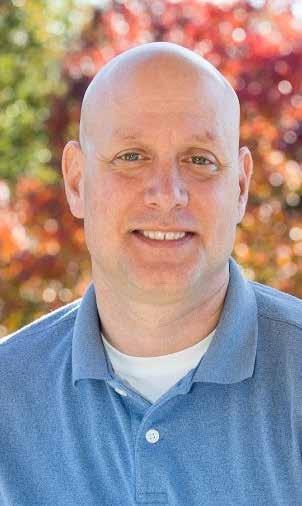
periences marching at the Pontiac SilverDome in Michigan and Lane Stadium at Virginia Tech flooded his memory as he reminisced on the changes to Bridgeforth Stadium where he once called home as an MRD.
All it took for Mark Wasson (’92) to fall in love with JMU was a simple walk on campus.


“After wandering around, I told myself that this was the university I wanted to get to,” Wasson said. “I love the area, and it just felt friendly.”
Wasson started off at JMU living in one of the upperclassmen dorms and later moved over to the Bluestone area on the Quad. His sophomore year, he lived in a little house across from the cemetery downtown with friends he said he keeps in touch with now. Having close access to downtown and exploring the surrounding area were some of his favorite experiences at JMU. Additionally, he said he connected with an organization called Harmony for gay and lesbian students.
His last year at JMU, Wasson was a part of student government and was the first openly gay student to participate. He was a commuter representative that governed policy, procedures and advocated for minorities. He also worked closely with Valley AIDS Network doing peer support and educating, as he said the AIDS crisis during his time at JMU was prominent.
“Feeling like I was a part of the university and Harrisonburg itself is my favorite memory,” Wasson said.
Through his on- and off-campus involvement, Wasson said his curiosity and desire to get involved helped to define his JMU experience, and he encouraged others to do the same and connect with what’s going on — and most importantly to have fun while doing it.
Beth McGinnis (’00) had been waiting for the opportunity to spread her wings and escape the small-town culture of Martinsville, Virginia, that characterized her life since she was young. Having parents that were both music majors drew her in the same direction, and on a visit to a JMU marching band competition, she discovered to the world of the Marching Royal Dukes. She ended up playing
the French horn and mellophone and joined Kappa Kappa Psi, a band fraternity on campus.
Like some JMU students, McGinnis started off as a biology major and quickly realized it wasn’t her thing. She said she also quickly realized that she wasn’t ready for the academic rigor of college and that high school didn’t prepare her for the course load. On top of academic struggles, during the first three months at JMU she said she was struggling with her own sexual orientation as well.
“It was kind of an initial awakening on some of that stuff; I have a lot of baggage on those issues, and I was not ready to look at myself because of dealing with having a gay father that I couldn’t talk to,” McGinnis said. “I was socially struggling to find my place and ultimately ran back into the closet for two and a half years.”
Her senior year, McGinnis said one of the most memorable moments she had while at JMU was coming out to her roommate on a night drive. This was something she and her roommate did traditionally to pass the time — filling the small two-door Honda Civic she rode in with conversations and listening to the roaring tractor-trailers pass them by on 81.
Having had an “immersive and life-changing experience” at JMU, she said she wishes she’d handled herself differently while being a Duke and encouraged other JMU students to keep this in mind during their time.
“Be authentic,” McGinnis said. “If you hide who you are and what you like and don’t like, then you’re not going to get as much out of your Madison experience. If you stay authentic and real, or you figure out what your authentic self is, then live that truth. Once you do, you never want to do anything else.”
Megan Gotimer (’15) took many memories with her after graduation, including those with her nowhusband. As a double major in political science and media arts and design with a journalism concentration, her studies opened many doors for involvement on campus, such as writing for the Breeze. She said she’s familiar with late nights in Harrison Hall all too well, editing footage and completing revisions on stories and projects until the sun came up. She was in the College Democrats for three to four years and was president for two of them. She had the opportu-
nity to study abroad in Austria, Croatia and Bosnia to work as a research assistant for two of her political science professors, which ultimately formed connections that helped her in the long run.
“The big piece that stood out for me was how dedicated and involved my professors in both the SMAD department and political science department were in helping with my resumes, cover letters and to get internships,” Megan said.
Megan’s husband, Patrick (’14), said getting involved on campus was a great way for him to have the Duke experience. Growing up in Leesburg, Virginia, attending JMU was an idea that had already simmered in his brain, Patrick said. After being a part of a dual enrollment geospatial sciences program, Patrick visited and toured some of JMU’s facilities and said he instantly fell in love. He got involved with athletics and the Sports and Leisure Association and Medicine club (SLAM), where guest speakers or sport professionals came in to talk to students and helped them break into the industry.
“It’s a lot of fun,” Patrick said. “I get to talk about sports all day with fans and get to have those one-on-one relationships while simultaneously getting to fundraise for the institution.”
As an alumnus, Patrick said he knows how important it is to take advantage of opportunities on campus. He said getting involved early and considering long term goals will help you in the future.
“The reason typically not for doing things is the fear of being rejected,” Patrick said. “If you can get over that fear, you can be okay with failing. Whatever thing you absolutely love, go get involved because there are other people just like you, and you are going to find that group.”
Falling in love with creating memorabilia began with Kate Cherry’s (’06) time at JMU.

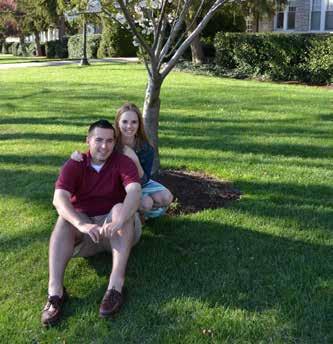
Cherry, originally from Roanoke, Virginia, applied to dozens of schools; however, she said JMU remained one of her top choices. She ultimately chose JMU because of its music program, and her long-term goal was being in the music industry in Nashville. She chose a music industry minor and double majored in media arts and design, with a corporate communication concentration, and art,
with a concentration in photography.
The late nights studying, doing homework, working on projects and immersing herself in her curriculum are what Cherry said helped her get a seat at the table and recognize exactly what she was looking for in a job. She oversaw all the internal communication and said she loved working with the other employees up until her move to Ohio with her husband right after she received Employee of the Year. Cherry picked up photography there, taking advantage of the fun she had capturing memories for her clients. She discovered wedding photography and said she fell in love with it and has been doing it ever since, taking it with her after moving two more times.
After almost a decade, Cherry finally returned to JMU.
“I hope everyone gets experiences like that; it was crazy how many memories were flooding back,” Cherry said. “Walking past my old dorm, the kissing rock where I got proposed to and going up to Massanutten to get skiing — I miss that.”
Chandler Moser (’09) originally came to JMU because he got a scholarship with the Army ROTC program, but his desire to get away from home was a bigger factor. He’d grown up in Vermont and said he was itching to get away from his high school friends.

He started off as a physics major, then went to pre-med, but said he had to consider the job climate and reality of med-school. Eventually, he switched to nursing with a minor in military science, inspired by his mother and sister who were both nurses. He’s now a registered army nurse and is studying at Johns Hopkins University in Baltimore to get his doctorate.
Clinicals are a major part of being a nursing major, and some involve students commuting to hospitals sometimes hours away from campus. At the time, Chandler was one of the only people in his clinical program that had a car, and in hindsight, he said it’s a great thing he did — it’s how he met his wife.
“Being honest with yourself and pacing yourself is important, but you’ll learn!”
Basketball was Gene Swindle’s (’13) life during his college years. At 6’11, he was a large presence on the court as a center. Basketball originally brought him to Virginia Tech from his home town in Miami,
Florida, but Swindle suffered an injury after three years at Virginia Tech and transferred to JMU in 2010 for another three years. Swindle ultimately suffered a career-ending injury to his knee during practice, after years of 6 a.m. workouts, practices and juggling the work of being a student athlete.
After college, Swindle began following his dream to work in the mortgage industry with his dad. He spent some time in Miami and later moved to Charleston, South Carolina, where he helped his brother with a startup construction company. He was later recruited by several finance companies leading him to where he is now: a financial advisor at Raymond James.
“I’ve loved it ever since. It’s fantastic to work with fantastic people,” Swindle said. “My whole life I thought I was going to play basketball, and here I am a financial advisor, all because one door shut and another one opened.”
After visiting five or six schools, JMU’s campus and location stood out to Rick Kern (’93) the most. Coming from West Chester, Pennsylvania, meant the commute was reasonable, and he had just enough space to be far away from home but close enough to return if needed. He attended JMU as a communications major with a concentration in human communications and has worked at an event sponsorship business for the past 20 years.
Campus was where Kern spent most of his time, he said. As a member of the club tennis team with a heavy involvement in student ambassadors, he was brought to campus frequently. He said the friends he made through those organizations are people he still keeps in touch with now.

Kern said JMU students should take advantage of everything JMU has and not to sweat the small stuff because the time goes fast.
“It’s such a great place, and there’s so much to do, and the educational opportunities are unmatched,” Kern said. “Get involved and try new things because college opens your eyes to so many things you would’ve never found otherwise.”
Words by Christina Butchko

These famous alumni sat in the same classes as you and ended up becoming major figures in their fields. Check out their majors and where they ended up in their careers.
JIM acOSTa

Graduation year: 1993

Major: Mass communication, with a minor in political science
What they’re known for: Chief Domestic Affairs Correspondent & Anchor for CNN, Senior White House Correspondent for CNN

aSHLEY IacONETTI

Graduation year: 2010

Major: SMAD
What they’re known for: Television personality (The Bachelor) and social media influencer

BrIDGET cONDON
Graduation year: 2015
Major: SMAD
What they’re known for: On-Air Talent NFL Media


LINDSaY czarNIak


Graduation year: 2000
Major: SMAD
What they’re known for: ESPN Anchor
JaSON MIYarES
Graduation year: 1998
Major: Business Administration
What they’re known for: The 48th Attorney General of Virginia
karEN MccULL aH
Graduation year: 1988

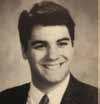
Major: Marketing
What they’re known for: Screenwriter and novelist, most known for co-writing comedies like 10 Things I Hate About You, Legally Blonde, Ella Enchanted, The House Bunny, and She’s the Man
46 Laurel Hill Road Verona, VA 24482 540.248.5300 office sales@midvalleypress.com
midvalleypress.com
Take this quiz and find out what kind of JMU org you might enjoy the most based on your personality!
JMU has many opportunities, and joining one of the 400 on-campus organizations is vital to the college experience. Whatever group(s) you decide to join will help you find your family here at JMU.
One way of getting involved includes visiting JMU’s Be Involved website. This is the official JMU website that includes the list of every org on-campus. This site can sort the list of clubs by categories and can be a good place to start if you want to know all of your options.
JMU also hosts a Student Org Night every semester where representatives
11 2 2 3 3 4 4
HOw DO YOU LIkE TO SPEND YOUr FrEE TIME?
A. Spending time with friends
B. Writing/reading stories/creating content
C. Listening to music/performing
D. Going on social media
E. De-stressing and possibly watch TV
wHaT waS YOUr FavOrITE cLUB IN HIGHScHOOL?
A. volunteering
B. yearbook/newspaper
C. band/choir/theater/dance
D. mental health/gsa/alliance clubs
E. national honor society/key club
HOw DO YOU PrEFEr TO MEET NE w FrIENDS?
A. those with similar interests
B. working on projects together
C. being on a team together
D. through shared experiences
E. joining extracurriculars
wHaT waS YOUr GO-TO cHILDHOOD GaME?
A. Monopoly
B. Scrabble
C. Charades
D. Uno
E. Clue
from on-campus clubs have booths showing off their org and what they do. When information about fall 2022 Student Org Night is available, it’s a great way to see some of the groups JMU has to offer come to life.
JMU’s on-campus orgs fall under several categories including service, publications, performing arts, multicultural and leadership, and it’s nearly impossible to pick which group(s) to be a part of. How are you supposed to know what you’ll like?
Words by Sydney Foster, Graphics by Megan Crews
5 5 6 6 7 7 8 8
wHaT IS YOUr LOvE L aNGUaGE?
A. acts of service
B. physical touch
C. quality time
D. words of affirmation
E. receiving gifts
wHaT wOULD OTHEr PEOPLE SaY IS YOUr BEST QUaLITY?
A. hard worker
B. good listener
C. sense of humor
D. reliable
E. energetic
wHEN DO YOU HavE THE BEST ENErGY?
A. when helping others
B. when creating
C. when performing
D. when you are with your friends
E. when you’re in charge
wHaT HavE YOU aLwaYS waNTED TO TrY BUT NE vEr HavE?
A. community service
B. create content
C. performing arts
D. be more active in social clubs
E. learn leadership skills
You might want to join a service org! You either love giving back to your community and helping others or want a place to start. These orgs are great character builders.
You might want to join orgs that create! You might feel a need to let out your creative side a little more by making movies, taking photos, writing or reading. These orgs can be the outlet you need outside of academics.
arTS
You might want to join a performance org! If you have ever taken up music, singing or dancing as a hobby, some of these clubs might be for you. These orgs are a great way to be a part of a group that you can take the stage with or just bond over your mutual love of the performing arts.
cULTUrE aND cOMMUNITY
You might want to join an org in the multicultural category! You are probably looking for a group of people you can rely on and who share your own experiences. These orgs are great for people looking for personal connections on-campus.
You might want to join an org that builds your leadership skills! These programs are a great way to enhance your leadership abilities and are considered some of the most well known orgs oncampus! If you want to be like your tour guide, OPA or FROG, these are the orgs for you!
• AMOM
• Community service learning
• Best buddies
• Fast for food
• Give volunteers
• Habitat for humanity
ExaMPLE OrGS:
• The Breeze/Breeze TV
• The Bluestone
• Public Relations Student Society of America
• Cinemuse Film Club
• Doghouse Productions
ExaMPLE OrGS:
• Any music ensemble club
• 5-way music orgs (KKY, TBS, PMA, SAI, FLOC)
• Dancing dukes
• Mozaic Dance Team
• visual distortions
• Kinetix Breakdance Crew
ExaMPLE OrGS:
• Cultural/ethnic student organtions (ex: Filipino Americans at Madison, Muslim Student Association, Black Student Alliance, etc)
• Brothers of a New Direction
• Future Teachers of Color
• My Sister’s Keeper
• National Association
ExaMPLE OrGS:
• Club Management Association of America
• Collegiate DECA
• Future Business Leaders of America - Phi Beta Lambda
• Make Your Mark on Madison (MYMOM)
• Omicron Delta Kappa
• Madison Recycling
• SafeRides
• Students Helping Honduras
• All service based greek orgs (ex: Gamma Sigma Sigma and Omicron Delta Kappa)
“It’s just people that are service oriented and want to help the community. We’re looking for people that want to push the mission, which is to make sure that JMU students get home safe.”
— cHaSE MYErS, SaFErIDES
“Those people who tend to stay, people who really just want to give everything they have to the kids. We are very fortunate to have a lot of very giving, very dedicated people.”
— aLY cOPPaGE, a MOMENT OF MaGIc
• Book club
• Her campus
• Photography club
• scratch pad.
• Women in Entertainment
• Word is Born Writer’s Society
“Basically any walk of life, if you have any interest in photography, you’re always welcome.”
— MarY rILEY, PHOTOGraPHY cLUB
“We really give students a chance to dip their toes into the field and learn about it, no matter what your major is.“
— DYLaN rEEvES-THackEr, DOGHOUSE PrODUcTIONS
• Acapella groups (ex: Exit 245 and Note-oriety)
• Heavy music club
• Latin Dance Club at JMU
• New & Improv.’d
• Weird cousins
“We actually have a very good mix of people that decided to join. I think it’s split in half and half, some people have just started dancing when they got into college, some people have been dancing their whole life.”
— GIavaNNI ParkEr, MOzaIc DaNcE“The best part about competing is just getting closer to each other by rehearsing.”
— cHarLIE THOMaS, NOTE-OrIETYfor the Advancement of Colored People
• Shades of Pride
• Society of Hispanic Professional Engineers
• TORCH: Together Obtaining Resources for College Help
• Women of Color
• All multicultural Greek orgs (ex: Kappa Alpha Psi and Sigma Iota Alpha)
“You don’t have to be Filipino to join, we accept everyone. We just want to spread awareness about our culture.”
— ISaBELLa caBaccaN, FILIPINO aMErIcaNS aT MaDISON
“I wanted to connect with other Black and queer students; with our school being a predominantly white institution, it was important for me to find people with similar backgrounds.”
— SHawN OvErBEY Jr., SHaDES OF PrIDE
• Professional Sales Club
• Society of Entrepreneurs
• Student Ambassadors
• Student Government Association
• Student Leadership Center
• University Program Board
• Women in Business
“[A] nice thing is that UPB offers a lot of leadership skills. There are opportunities for you to apply and be on the executive team, but you can also take on different roles within your committee.”
rEGaN“It’s really just people who have an open mind and want to learn about leadership and what they can do as a leader.”
—
ISaBELLa caBaccaN, MakE YOUr Mark ON MaDISON—
LENzI, UNIvErSITY PrOGraM BOarD
CommonWealth One is JMU’s trusted, full-service credit union, and student banking is better here. We’re conveniently located on campus and offer everything you might need financially as a student. What we don’t have? Excessive and unnecessary fees.
When it comes to handling your finances as a student, we’ve got your back with:

The secret is out – CommonWealth One is here to help you thrive financially at JMU.
To open an account or learn more about JMU Student Perks, which include special events, free food and prizes, visit cofcu.org/JMU or stop by our branch in The Union (next to the post office)

The best place for banking isn’t a bank at all!



